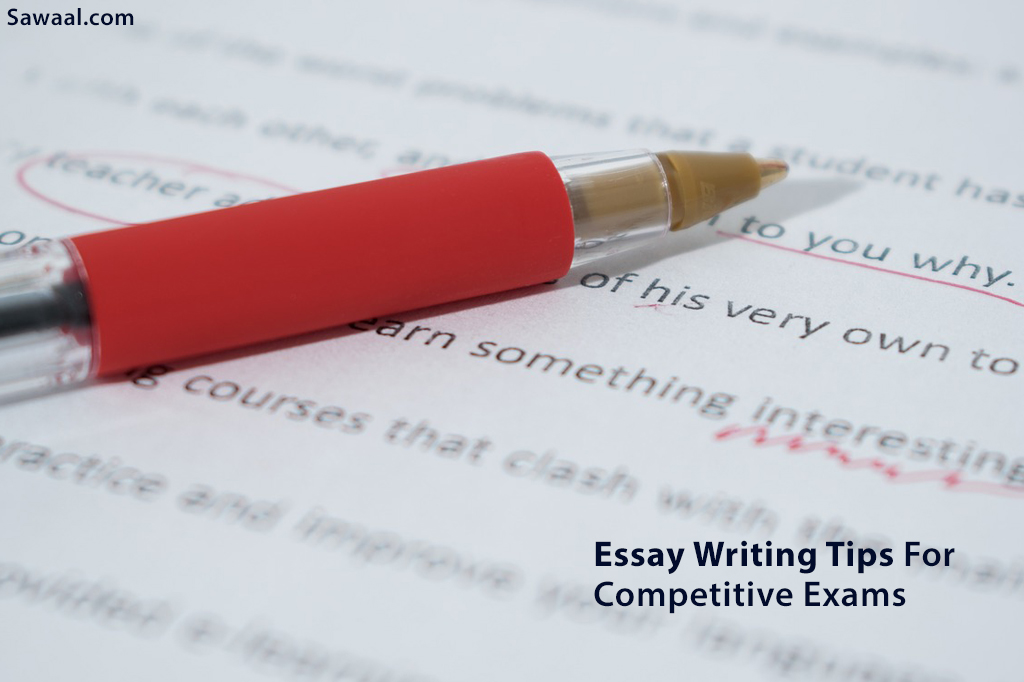

Tips for Writing Essays in a Competitive Examination
Every individual, at one stage or the other, has had to appear for some competitive examinations. These competitive examinations rather act as an elimination procedure to select the best candidates for a particular position (in case of examination to fill in some specific vacancies) or a particular seat (in case of some academic program). The candidates, thus, are tested on various parameters such as their logical reasoning, their critical analysis, their thought process, and most obviously on their writing abilities. The writing abilities and the structuring of their thought process are tested mainly with the use of Essays. Candidates, therefore, might require some essay writing tips for competitive examinations.
Exam Essay Topics
Competitive examinations are directed towards achieving some particular objective, mostly in terms of selecting a candidate for a particular position or selecting students for a particular study program. Therefore essay topics for selecting the right candidate need to fulfill the basic criteria of such examination. An example of this would be in case the position requires testing the candidate on good judgmental capabilities or analytical capabilities, the relevant exam essay topic would certainly be an open ended question which needs to be justified, clarified, and analyzed according to their understanding and depth of knowledge. Mostly, the candidates are given relevant current affairs based topic which has relevance in the current context and the candidate would most likely be aware of such a topic.
English Essays for Competitive Exams
Competitive examinations are held in order to test different attitudes and aptitudes of the candidate. Thus on one hand they are being tested for analytical abilities and on the other they are being tested on their understanding of the current affairs. However, among all the questions, essay based questions serve two purposes. On one hand such question tests the awareness and understanding of a particular issue (mostly related to current affairs or related to their subject area) and on the other hand the fluency in English as a subject of communication too is being tested through these essays. The candidate appearing for such English essays in competitive examination thus need to focus on their writing styles, grammar, and flow of content while presenting their depth of knowledge.
Read – [ Some English Gk Questions and Answers ]
Certification Questions
A competitive examination tests the candidate on almost all parameters. While the essay questions test their English language capabilities, the certification questions test their subject knowledge and certify their aptitude and understanding of the subject.
Read – [ Important Certifications Questions and Answers ]
15 essay writing tips for competitive exams
Focusing more on the essay questions given in competitive examinations, the candidates surely need some handy essay writing tips for appearing and becoming successful in competitive exams. Essays require a good amount of information which needs to be logically and factually presented in the structured format within the stipulated time period, that too without the help of any secondary sources, especially the internet. Therefore, the following list of tips would surely be handy for the candidates:
Before the Examination:
- The candidate should identify the recent affairs happening within the global space, at least the most important one.
- The candidate should gather as much information about these events and affairs as possible which should include key definitions, brief description of the issue, brief sequence of events, comparing and contrasting any views available on such events, among others.
- The candidate should memorize such information to the best of their abilities.
- The candidate should practice writing essays on such events and topics incorporating as much information as possible.
- The candidate can even take short notes of such key information and revise the same whenever possible so that important points are not left out.
During the Examination:
- The candidate should read the question carefully.
- The candidate needs to understand the question and the context in which such a question has been designed.
- In case the candidate gets the topic or similar topic which he or she has been practicing, then create a “memory dump” and write down all the memorized information in short notes style.
- Then elaborate on the points mentioned in such memory dump one at a time while concentrating on the flow of text and idea in such a case.
- While writing such an informed essay start by formulating a thesis which would answer the entire question asked. The candidate can take help of the wording from the question to formulate the thesis. This should be done in the very first paragraph of the essay.
- Along with the thesis statement, a brief introduction to the topic of the question and at least a brief hint of the argument which would be supported in the essay should also be provided in the first paragraph of the essay.
- The candidate should try to provide as many supporting arguments and evidences as possible. This would make the essay strong and convincing.
- The candidate should try to make a persuasive argument (mostly the question of the essay does not have close ended answers of right or wrong) in order to sound convincing to the evaluator.
- In case the candidate gets a topic which he/she has not practiced, it is best not to panic. At best, the candidate needs to think with an open mind and try to logically remember any hint of such a subject or at least derive some logic from the question in order to write something on the topic in a logical manner such that at least the evaluator is impressed by the writing style.
- Leaving out the essay is not a good option since it not only carries a good weightage of number but also is important in evaluating your writing skills. While logic does not support, it is best to at least have a convincing write up which can portray one’s writing and communicating powers.
While good preparation is the key to success for any competitive examination, such essay writing tips for competitive exams would certainly come in handy at the precious moments of preparation and attending the competitive examination.

25,000+ students realised their study abroad dream with us. Take the first step today
Here’s your new year gift, one app for all your, study abroad needs, start your journey, track your progress, grow with the community and so much more.

Verification Code
An OTP has been sent to your registered mobile no. Please verify

Thanks for your comment !
Our team will review it before it's shown to our readers.

- Indian Exams /
English for Competitive Exams
- Updated on
- Mar 21, 2023

While most Indian students are comfortable with the quantitative section of competitive exams such as CAT, GMAT , GRE , IELTS , etc, English for competitive exams remains a challenge for many. With equal weightage, if not more, to English for competitive exams as to Maths, it’s imperative to gain clarity about basic grammar rules , understand the skills it needs to crack the verbal section of competitive exams and get extremely comfortable and confident with English for competitive exams. Does the “English monster” petrify you and gives you doubts about cracking the competitive exam you are preparing for?
Worry not, you will conquer and win over this monster after reading this guide. This blog will help you gain clarity on general English for competitive exams, the best English books for preparation , golden rules of grammar, tips to improve your score in the verbal section of various competitive exams , and the types of questions asked!
This Blog Includes:
English grammar for competitive exams, basic error types in english for competitive exams, idioms & phrases, one-word substitution, one word substitution for ssc cgl, sentence correction, reading comprehension, vocabulary to improve english for competitive exams , english grammar quizzes, english grammar rules for competitive exams , competitive exam books for english, ssc books for english, english books for upsc, read newspapers regularly , keep revising grammar rules , prepare for reading comprehension, excel at spotting errors , build a strong vocabulary, work on your listening skills, time management.
English is one of the most scoring sections of competitive exams if you do them well. They are designed to understand your proficiency and understanding of English. Moreover, if you are able to answer Grammar questions correctly and quickly, you have more time to focus on other sections of the exam. So, let’s check out some of the important English grammar sections for competitive exams:
- Prepositions
- Homophones/Homonyms
- Sentence Correction Questions
- Sentence Rearrangement & Para jumbles
- Idioms And Phrases
- Subject-Verb Agreement
- Reported Speech
- Active And Passive Voice
- Conjunctions
- One Word Substitutions
- How to write Articles
- Confusing Words
- Synonyms and Antonyms
- Letter Writing Format
- Spotting the Error
- List of Prepositions
- Poetic Devices
- Rules For Tenses
General English for Competitive Exams
Most competitive exams test the verbal skills of candidates with questions based on topics like Nouns , Pronouns , Adjectives , Adverbs, Tenses , Prepositions , Conjunctions , Active and Passive Voice , Reporting Speech , Diction, etc. Knowledge of these topics will help you answer the questions on the verbal section of competitive exams. Appearing for IELTS , TOEFL or PTE is an elementary yet painstaking effort if you’re planning to study abroad . If you want to know more, read our blog on English Proficiency Tests .
- Subject-Verb Agreement
- Parallelism
- Modifiers
- Grammatical Construction
- Diction
- Logical Prediction
- Idioms
- Rhetorical Construction
- Vocabulary
Syllabus in English for Competitive Exams
Here are the major topics that are usually covered under the section of English for Competitive exams, be it CAT , SSC or other prominent entrance exams.
Now, let’s impart you with the key tips and tricks to crack these English section topics in competitive exams:
A unique combination of ‘fill in the blanks with ‘reading comprehension, a cloze test comprises of a paragraph having some missing words in it that the student is asked to add. As a prominent part under English for competitive exams, while taking a cloze test, you must first try to familiarize yourself with the flow and context of the passage.
Under this topic of English for competitive exams, remember to
- Read the passage meticulously and carefully.
- Link sentences to each other which will help you find the right word to fill in the blanks
- Gauge the tone of the passage and negate options accordingly which will give you the right answer.
- Highlight keywords that are frequently or prominently used.
Idioms and phrases can be another bewildering topic you might encounter while preparing for English for competitive exams. English idioms and phrases can be quite complex to understand and tackle, there are some useful tricks that can help you memorise them easily. Here is a list of hacks and tricks that can assist you in remembering idioms and phrases as well as their meanings.
- Comprehend the context of an idiom or phrase, especially in the situation in which it is used. The most important quality of idioms and phrases is that they are situational, and contextual as well as might suit one situation or even more than that.
- Don’t mug up idioms, phrases and their meanings but try to build up a story or visual around them which will help you remember them in the long run.
- You can also delve deeper into an idiom or phrase and its origins which can further assist you in cracking this section of English for Competitive exams.
The master key for nailing one-word substitution is to constantly practice them through different sample papers and mock tests. Read newspapers regularly and try learning five new words every day. Your vocabulary will significantly play an important role in solving one-word substitutions.
One Word Substitution Quiz

Your answer:
Correct answer:
Your Answers
One-word substitution words are very commonly asked in SSC CGL exams and weigh highly as well. So, here are some of the common word substitutions asked in SSC CGL for you to prepare:
In English for competitive exams, you will come across sentence correction questions that many find confusing and complex to solve. This topic depends upon various other grammar concepts such as subject-verb agreement, modifiers, and tenses , amongst others. While practising this topic, some of the essential tips you can utilise are:
- Start with locating errors in the questions, they might be in the structure, placement of verbs, or even in dictions (affect instead of effect).
- Once you have found the error, the next thing is to eliminate the wrong options.
- Sometimes the shorter answer is the right one because long options are added to confuse the student. So, choose accordingly.
- Substitute your answer within the sentence and see if it makes sense. If it does, select it otherwise go through the sentence again and reconsider the other options.
As a prominent inclusion under English for competitive exams, Reading Comprehension comprises a passage which is then followed by certain objective or multiple-choice questions that the test-taker needs to answer. The useful tips and tricks for nailing Reading Comprehension are as follows:
- Narrow down a central idea that has been talked about in the passage.
- Comprehend the context of the paragraph and note down the key pointers discussed.
- While solving questions, use those key pointers and once you have found the answers, connect them with the content of the passage to recheck.
- For synonym or antonym -related questions, choose the option which suits the content of the passage and your vocabulary will also play a pivotal role in finding the right answer for these types of questions.
While working on your English for competitive exams, it’s also important to build a strong vocabulary. Read our blog on 50 difficult words and meanings to start building a foundation of extensive vocabulary that will help you master English for competitive exams. In addition to this, it’s also important to understand the difference between similar words that have been confusing us for the longest time.
- Lie – be in or assume a horizontal or resting position on a supporting surface. Lay – put (something) down gently or carefully.
- Hanged – kill (someone) by tying a rope attached from above around their neck and removing the support from beneath them. Hung – suspend or be suspended from above with the lower part dangling free (used for things, not people).
- Adapt – make suitable. Adopt – take a child as one’s own.
- Allusion – pleasant and good-tempered. Illusion – false notion.
- Besides – by the side. Besides – in addition to.
- Childish – Silly. Childlike – Innocent.
- Historic – famous or important in history. Historical – pertaining to history.
- Verbal – relating to words. Verbose – wordy.
- Disinterested – free from bias or prejudice. Uninterested – not interested.
Now that you have learned what comes with these competitive exams, let’s take some interesting short quizzes that will help you understand your proficiency in English.
Editing Quiz
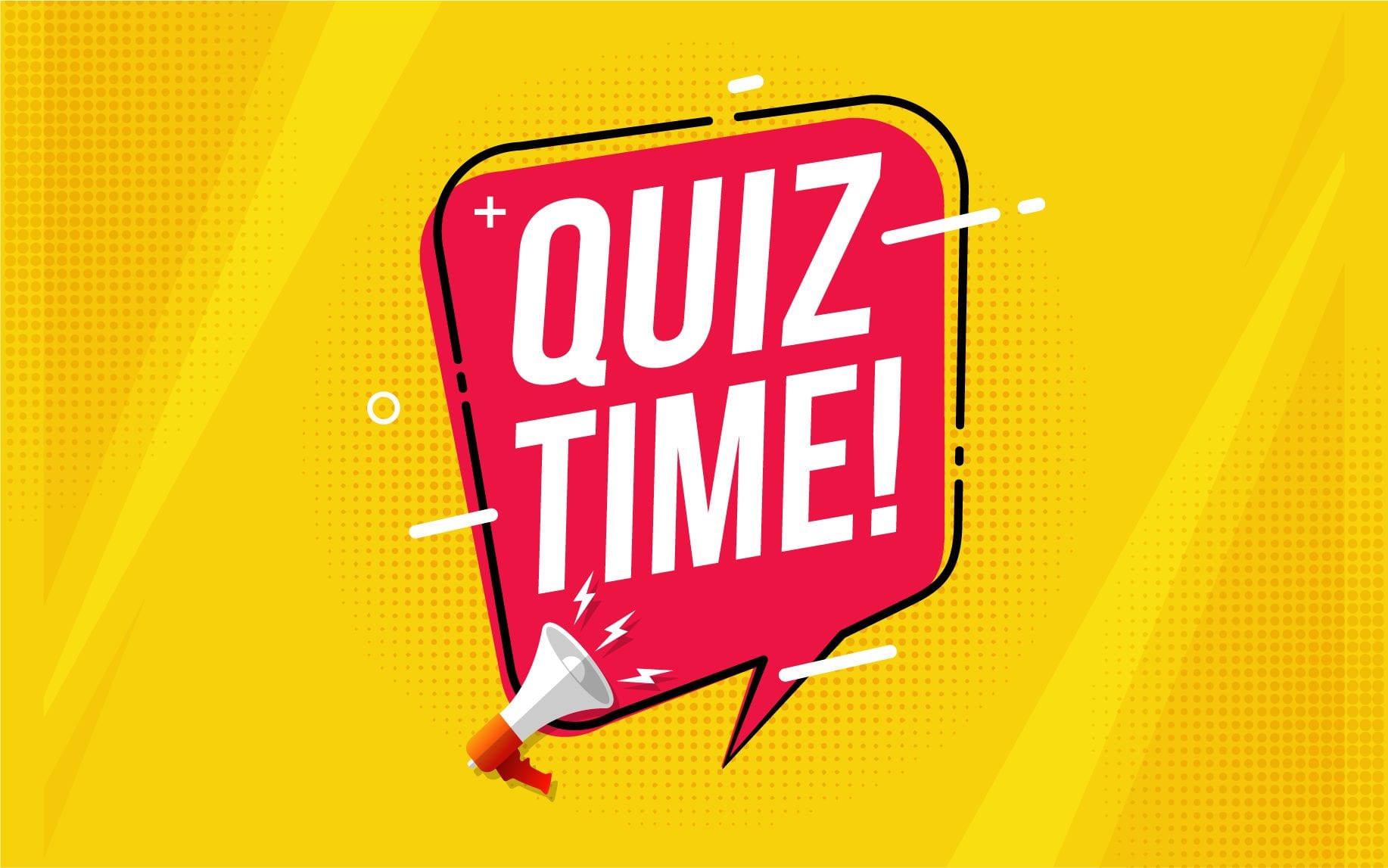
Here is a list of a few must-know grammar rules to help you prepare for English for competitive exams and crack the verbal section of any competitive exam:
- When a Noun or Pronoun is placed before a gerund (ing-word), it must be in the possessive case. For example, I was pleased with Robert’s coming here. But the possessive case cannot be used with a gerund when the noun devotes a lifeless thing. For example, there is no danger of the wall (not walls) falling down.
- A Proper Noun becomes a common noun when it is used in plural form or when an article is placed before it. For example Five Gandhis, the Miltons, etc.
- A Collective Noun takes a Singular Verb when the whole group is considered as one unit. Example: The Committee consists of 5 members. But if we refer to the members of the community separately, the verb takes the plural form. Like, The community have taken their seats.
- While confessing a fault (or expressing a negative idea) the should be – first, second, and then third. However, when expressing praise or a positive idea, the sequence of personal pronouns is second, third, and then first.
- Few/Fewer/Many are used before Countable Nouns while Less/Lesser/Much is used before Uncountable Nouns.
- An Adverb should never be placed between ‘to’ and the Verb.
- When the subjects joined by ‘either-or’, or ‘neither-nor are of different persons, the Verb will agree in person and number with the Noun nearest to it.
- If connectives like ‘ with’, ‘together with, ‘as well as, ‘ accompanied by ‘, etc are used to combine two subjects, the verb agrees with the subject mentioned first.
- ‘That ‘ in a sentence is used for crucial information while ‘ which ‘ is used for additional information.
- Generally ‘ as ‘ is followed by a Verb and ‘like ‘ is followed by a Noun.
- ‘Like ‘ is used to present similarity whereas ‘ such as ‘ is used to give examples.
- ‘ Compared to ‘ is used to draw a comparison between unlike things while ‘ Compared with ‘ is used to draw a comparison between like things.
- Advice is an Uncountable Noun. ‘ Advices ’ is wrong.
In order to prepare well for the exam, you need to prepare with good resources. Studying top-rated books for your competitive exams will help you ace your exams!
Check out the best books for English for competitive exams:
- Objective General English by S.P. Bakshi
- English Grammar and Composition by SC Gupta
- Word Power Made Easy by Norman Lewis
- Objective English for Competitive Examination by Hari Mohan Prasad and Uma Sinha
- General English for All Competitive Course by SC Gupta
- Tips and Techniques in English for Competitive Exams by Disha Experts
- Essays for Civil Services and Other Competitive Exams by Pulkit Khare
The following SSC CGL books are perfect for the students preparing for one of the most renowned exams on a variety of topics like synonyms, antonyms, one-word substitution, sentence correction , idioms and phrases, spelling tests, etc.
- Competitive General English by Kiran Prakashan
- Previous Year Papers by MB Publications
- Corrective English by A.K. Singh
Here are some of the best books for UPSC Exam’s English section that you can prepare from:
- General English a Book for UPSC and State Civil Services
- 7 Years UPSC IAS/ IPS Mains English
- IAS Mains Compulsory English
- 8 Years UPSC Civil Services IAS Mains English
- Compulsory English by Hari Mohan Prasad
- Lucent’s Prelims General Studies for UPSC and PCS 2022 Edition in English
How to Improve General English for Competitive Exams?
Here are a few tips and tricks to improve English for competitive exams:

The importance of reading newspapers regularly not only adds to your knowledge but also helps you improve your vocabulary and broaden your horizons, provided you read it the right way.
- Firstly, time your reading for every major article, keep the stopwatch running. This simple act will make you faster and more focused.
- Don’t miss the editorials. Editorial articles are big and rich and they should form the core of your reading practice.
- Use highlighters and pens to mark new words, difficult phrases, key ideas, etc that you come across while reading the newspaper.
- Write down everything you have learned (like new words, phrases, etc ) in a separate place and review it periodically.
With so many concepts and rules for grammar you need to remember for English for competitive exams, it will be a good idea to revise the grammar rules on a daily or weekly basis.
- You can prepare flashcards and carry them with you while you are travelling and make sure you go through them whenever you get time.
- Make sure you use the vocabulary and grammar rules that you use in your writing; be it an assignment or a mere WhatsApp message.
- Take guidance from some of the best English Grammar books .
Nailing the reading comprehension section of English for the competitive exam depends on your reading speed, efficient analysis, repeated practice and strong vocabulary. Here are a few tips to understand this section:
- Focus on the linking words like yet , however , on the other hand , but , in contrast , in conclusion , in addition , etc. This will allow you to establish a structure to the text.
- Never get too lost in the details and try to understand the whole passage. Instead, work from the questions back to the passage. Once you have read the question, you know exactly what you are looking for and this will help you fetch the answer easily.
While improving your English for competitive exams calls for going into the basics of grammar and honing verbal ability skills, it’s also important to excel in the ability to identify errors quickly and reach the correct answer effectively.
- Read the sentence completely and understand the meaning and structure of the sentence.
- Try to find the evidence for your answer, instead of choosing an answer just because you think it is correct.
- Remember that answer choices in passive voice are usually incorrect.
- Scan the answer choices for obvious differences and low-hanging fruits – the first and last words of each answer choice, pronouns, and verbs.
Related Read
Having a strong vocabulary can always help you ace English for competitive exams. You can use the following techniques:
- Learn at least one new word every day and use it in general conversations.
- Flashcards can be the best way to memorise words easily.
- Make use of smartphone apps like U-Dictionary, Vocab24, English Grammar Ultimate, Duolingo, English Grammar Handbook, etc. to learn on the go.
Recommended Read:
- Best English Speaking Books
- How to Speak Fluent English in 30 days
Having strong listening skills gives you the ability to apply your knowledge of the language in everyday settings.
- Listen to English TV, online videos, podcasts, radio, movies or whatever you can find.
- After listening to a short passage, try to think of questions that could be asked and try answering them accordingly.
- If you have difficulties in understanding the accent, practice by playing an audio message and then reading the content. It is important to work on your pronunciation.
- Focus on the meaning, try to understand the idea and draw conclusions.
Time Management is the key to master English for competitive exams. Try to finish the section as soon as possible because it will give you an upper hand over others.
We hope that all these concepts, types of questions, grammar rules, and tips and tricks will help you prepare well for English competitive exams. If you need any help with the preparation of competitive exams like GMAT, GRE, IELTS, etc, you can get in touch with Leverage Edu and kickstart your journey to success.
Sonal is a creative, enthusiastic writer and editor who has worked extensively for the Study Abroad domain. She splits her time between shooting fun insta reels and learning new tools for content marketing. If she is missing from her desk, you can find her with a group of people cracking silly jokes or petting neighbourhood dogs.
Leave a Reply Cancel reply
Save my name, email, and website in this browser for the next time I comment.
Contact no. *
Very well explained the key areas one needs to focus on Verbal/English Section, to prepare themselves for various competitive exams. I liked it.

Leaving already?
8 Universities with higher ROI than IITs and IIMs
Grab this one-time opportunity to download this ebook
Connect With Us
25,000+ students realised their study abroad dream with us. take the first step today..

Resend OTP in

Need help with?
Study abroad.
UK, Canada, US & More
IELTS, GRE, GMAT & More
Scholarship, Loans & Forex
Country Preference
New Zealand
Which English test are you planning to take?
Which academic test are you planning to take.
Not Sure yet
When are you planning to take the exam?
Already booked my exam slot
Within 2 Months
Want to learn about the test
Which Degree do you wish to pursue?
When do you want to start studying abroad.
September 2024
January 2025
What is your budget to study abroad?

How would you describe this article ?
Please rate this article
We would like to hear more.
Essays on Various Topics - List of Essay Writing Ideas
Essay writing is not everyone’s cup of tea. Most students find it difficult to begin writing. Essays can be made easier if students start thinking about the topic either through brainstorming or by putting them down on a sheet of paper. After getting the ideas, they need to know how to organise them to form an essay. For this, they need to practise essays on different topics. Here, we have compiled a list of Essays on various topics.
These are the general essay topics which are most likely to be asked in the exam. Some of these essay topics are also picked from past year papers. Students of Classes 6 to 10 can go through these essays and know the right way of expressing their thoughts to form a perfect essay. Apart from the CBSE , students of ICSE and other state boards can also use these topics to prepare for their English exams.
Essay Topics: List and Writing Ideas
Usually, one essay is asked in the English paper. The essay writing question mainly comes under the writing section and comprises 5 to 10 marks. By having a look at the essays on the below-mentioned topics, students can easily score these marks in the exam.
We will be soon updating more Essays.
Characteristics of a Good Essay
A composition on a particular topic consisting of more than one paragraph is an essay. The characteristics of a good essay are:
1) Unity: The essay should deal with the main subject and all parts of it should be clearly linked with that subject.
2) Coherence: There should be a logical sequence of thought. This requires a logical relationship between ideas, sentences and paragraphs.
3) Relevance: Unimportant information should not be included.
4) Proportion: Give more space to important ideas.
Students can also get the essays for class 2 and class 3 to improve their writing skills.
Types of Essays
Essays are mainly ways of expressing one’s ideas and thoughts. Essays vary in how one narrates a personal experience, describes an issue, or convinces the reader to accept a certain viewpoint. So, essays are mainly classified into four major types, as mentioned below:
1) Narrative Essays: Telling a Story
While writing a narrative essay, students must consider the topic as if telling a story. Through these essays, they can express themselves in a creative way. These essays are usually written in the first person, so as to engage the readers.
2) Descriptive Essays: Painting a Picture with Words
In a descriptive essay, students have to paint a picture with words. They have to describe something. It can be an object, person, place, experience, emotion, situation or anything else. These essays allow students a great deal of artistic freedom.
3) Expository Essays: Presentation of the Facts
An expository essay is an informative piece of writing that presents a balanced analysis of a topic. To write a good expository essay, students need to investigate the topic, evaluate evidence, express the idea, and set forth an argument clearly and concisely. It can be done by comparison and contrast, definition, example, the analysis of cause and effect, etc.
4) Persuasive Essays: Convince Me
A persuasive essay is one in which a writer tries to convince the reader to accept his/her viewpoint. It presents all sides of the argument but clearly communicates the writer’s personal opinion.
CBSE Unseen Passages
Students can increase their scores in the reading section of the English paper by practising the comprehension passages. To help them, below, we have listed the links to unseen passages.
Students must have found these Essay Topics helpful for their studies. For more study material and latest updates on the CBSE / ICSE / State Board / Competitive exams, keep visiting BYJU’S. Also, download the BYJU’S App for interactive study related videos.
Frequently Asked Questions on Essay writing Essay
How should students practise essay writing.
The following points should be remembered while practising essay writing: 1. Constant written practice is required for honing essay writing skills. Writing alone tests the competency of the students to ideate and execute a proper essay within a specified time. 2. In-depth knowledge on various topics is a prerequisite for students preparing to write essays in school exams and competitive examinations. Such knowledge can be acquired by regularly developing a habit of reading extensively — especially newspapers and magazines — and following other news sources on various media available to them. 3. Developing a good vocabulary is another important factor students should focus on. Essay writing demands a more formal and extensive vocabulary as the range of topics asked are so wide-ranging. Every topic will demand familiarity with words and phrases pertaining to it. Use of good idiomatic English rich with apt vocabulary will help students pen memorable essays.
How to write an essay on an unknown or unfamiliar topic?
If an essay topic is unfamiliar then students can try to write in general about topics which are related to the main topic. Reading magazines and books can help in acquisition of knowledge in various subject matters.
How to score high marks in essay writing?
Given below are some of the points to be considered to ensure that students can score high marks in essay writing. 1. Maintain flow of text in essay: Ensure that the essay follows a natural progression from introduction to conclusion. Make sure that each paragraph is thematically or logically connected to successive paragraphs. Only then will the essay be evocative and easy to read and comprehend. 2. Phrase the essay is a relatable way: Keep the target audience in mind while drafting the essay and use images and language that resonate with them. Otherwise it would fail to connect with the reader, even if you have come up with a decent essay. 3. Be creative: Show the audacity to think out of the box and to deviate from traditional ways of writing essays while coming up with ideas to present your viewpoints in the essay. Readers will be immediately drawn to a piece of writing that gives them a fresh perspective, even if you are writing on a very common topic. But too much creativity and idiosyncratic writing will only mar an otherwise well-researched essay. 4. Present the essay in a better manner: Always think of new ways and strategies to present your ideas which you may have drawn from multiple sources. Doing background research is definitely essential. But that does not mean that you have to present the content you found in the same way. A fresh approach can turn a boring essay into a very engaging one. 5. Do not be over confident: Essays usually require students to state personal opinions as well as facts. Be prudent in voicing your opinions as well as in stating facts – make sure you don’t hurt the sentiments of readers when writing on sensitive and controversial topics. Practice diligence, not overconfidence, while writing essays as a best practice.
Leave a Comment Cancel reply
Your Mobile number and Email id will not be published. Required fields are marked *
Request OTP on Voice Call
Post My Comment
- Share Share
Register with BYJU'S & Download Free PDFs
Register with byju's & watch live videos.

Counselling

Embarking on a transformative journey through six chapters, we traverse India's landscape, exploring pioneering startups and their revolutionary...
- Sustainability
- Agriculture
- Brand Campaigns
- Watch inspiring videos
- Advertise With Us
- Press Coverage
Follow Us On
Download App
How to Write Essays to Score Well in Competitive Exams? IAS Officer Shares Tips
In this Twitter thread, IAS officer Divya Mittal explains five key elements and tips to write well for essay type questions in competitive exams like UPSC CSE.

Similar Story

Used in Luxurious French Perfumes, What Makes Madurai’s Jasmine Oil So Expensive?
Why is jasmine oil so expensive? The answer lies in its making — watch this video to see what goes behind the process, and how the final result travels across the globe.
How to write well for essay type questions in competitive exams. Includes some resources to hone writing skills for other purposes like editorials etc. A ?— Divya Mittal (@divyamittal_IAS) December 4, 2022
2. Thesis statement

ISRO Announces Free Online Course For Students, Researchers & More; Details Here
ISRO’s centre IIRS has announced a five-day free online course called Basics of Geocomputation and Geoweb Services, which commences on October 31. Check your eligibility and how to apply here.
Hook: Why should someone be interested in what you are writing? Set the scene & grab attention. – Story/anecdote – Catchy phrase – Cite a shocking fact – Witty statement – Personal experience Or it can simply answer the question – “I am writing this piece because..”— Divya Mittal (@divyamittal_IAS) December 4, 2022
3. Connection between paragraphs
4. rebuttal paragraph:, 5. conclusion:.
Remember to: – Use simple language – Avoid too many adjectives, adverbs – Use active voice – Be coherent— Divya Mittal (@divyamittal_IAS) December 4, 2022
This story made me
Tell Us More
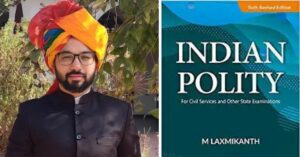
IAS Officer Shares 4 Important Tips to Ace Polity Paper in UPSC CSE
IAS officer Manjul Shashi Jindal's Twitter thread helps aspirants prepare better for the polity paper in UPSC CSE.
We bring stories straight from the heart of India, to inspire millions and create a wave of impact. Our positive movement is growing bigger everyday, and we would love for you to join it.
Please contribute whatever you can, every little penny helps our team in bringing you more stories that support dreams and spread hope.

Sounds Interesting? Share it now!
1 7 Legendary Places in Mumbai for The Best Ice Cream & Iconic Flavours
2 Watch: How My Mom & I Started Our Mushroom Farming Business That Earns Rs 40000/Day
3 How An Engineer Is Recycling 1.25 Lakh Litres of Greywater Everyday In Apartments
4 Netaji Bose's Favourite Eatery Has Been Serving Traditional Delicacies for Over 100 Years
5 With a Turnover of Rs 3 Crore, Couple Has Made Over a Million Eco-Friendly Bags
- Get positive stories daily on email
- Join our community of positive ambassadors
- Become a part of the positive movement

Purdue Online Writing Lab Purdue OWL® College of Liberal Arts
Writing Essays for Exams

Welcome to the Purdue OWL
This page is brought to you by the OWL at Purdue University. When printing this page, you must include the entire legal notice.
Copyright ©1995-2018 by The Writing Lab & The OWL at Purdue and Purdue University. All rights reserved. This material may not be published, reproduced, broadcast, rewritten, or redistributed without permission. Use of this site constitutes acceptance of our terms and conditions of fair use.
While most OWL resources recommend a longer writing process (start early, revise often, conduct thorough research, etc.), sometimes you just have to write quickly in test situations. However, these exam essays can be no less important pieces of writing than research papers because they can influence final grades for courses, and/or they can mean the difference between getting into an academic program (GED, SAT, GRE). To that end, this resource will help you prepare and write essays for exams.
What is a well written answer to an essay question?
Well Focused
Be sure to answer the question completely, that is, answer all parts of the question. Avoid "padding." A lot of rambling and ranting is a sure sign that the writer doesn't really know what the right answer is and hopes that somehow, something in that overgrown jungle of words was the correct answer.
Well Organized
Don't write in a haphazard "think-as-you-go" manner. Do some planning and be sure that what you write has a clearly marked introduction which both states the point(s) you are going to make and also, if possible, how you are going to proceed. In addition, the essay should have a clearly indicated conclusion which summarizes the material covered and emphasizes your thesis or main point.
Well Supported
Do not just assert something is true, prove it. What facts, figures, examples, tests, etc. prove your point? In many cases, the difference between an A and a B as a grade is due to the effective use of supporting evidence.
Well Packaged
People who do not use conventions of language are thought of by their readers as less competent and less educated. If you need help with these or other writing skills, come to the Writing Lab
How do you write an effective essay exam?
- Read through all the questions carefully.
- Budget your time and decide which question(s) you will answer first.
- Underline the key word(s) which tell you what to do for each question.
- Choose an organizational pattern appropriate for each key word and plan your answers on scratch paper or in the margins.
- Write your answers as quickly and as legibly as you can; do not take the time to recopy.
- Begin each answer with one or two sentence thesis which summarizes your answer. If possible, phrase the statement so that it rephrases the question's essential terms into a statement (which therefore directly answers the essay question).
- Support your thesis with specific references to the material you have studied.
- Proofread your answer and correct errors in spelling and mechanics.
Specific organizational patterns and "key words"
Most essay questions will have one or more "key words" that indicate which organizational pattern you should use in your answer. The six most common organizational patterns for essay exams are definition, analysis, cause and effect, comparison/contrast, process analysis, and thesis-support.
Typical questions
- "Define X."
- "What is an X?"
- "Choose N terms from the following list and define them."
Q: "What is a fanzine?"
A: A fanzine is a magazine written, mimeographed, and distributed by and for science fiction or comic strip enthusiasts.
Avoid constructions such as "An encounter group is where ..." and "General semantics is when ... ."
- State the term to be defined.
- State the class of objects or concepts to which the term belongs.
- Differentiate the term from other members of the class by listing the term's distinguishing characteristics.
Tools you can use
- Details which describe the term
- Examples and incidents
- Comparisons to familiar terms
- Negation to state what the term is not
- Classification (i.e., break it down into parts)
- Examination of origins or causes
- Examination of results, effects, or uses
Analysis involves breaking something down into its components and discovering the parts that make up the whole.
- "Analyze X."
- "What are the components of X?"
- "What are the five different kinds of X?"
- "Discuss the different types of X."
Q: "Discuss the different services a junior college offers a community."
A: Thesis: A junior college offers the community at least three main types of educational services: vocational education for young people, continuing education for older people, and personal development for all individuals.
Outline for supporting details and examples. For example, if you were answering the example question, an outline might include:
- Vocational education
- Continuing education
- Personal development
Write the essay, describing each part or component and making transitions between each of your descriptions. Some useful transition words include:
- first, second, third, etc.
- in addition
Conclude the essay by emphasizing how each part you have described makes up the whole you have been asked to analyze.
Cause and Effect
Cause and effect involves tracing probable or known effects of a certain cause or examining one or more effects and discussing the reasonable or known cause(s).
Typical questions:
- "What are the causes of X?"
- "What led to X?"
- "Why did X occur?"
- "Why does X happen?"
- "What would be the effects of X?"
Q: "Define recession and discuss the probable effects a recession would have on today's society."
A: Thesis: A recession, which is a nationwide lull in business activity, would be detrimental to society in the following ways: it would .......A......., it would .......B......., and it would .......C....... .
The rest of the answer would explain, in some detail, the three effects: A, B, and C.
Useful transition words:
- consequently
- for this reason
- as a result
Comparison-Contrast
- "How does X differ from Y?"
- "Compare X and Y."
- "What are the advantages and disadvantages of X and Y?"
Q: "Which would you rather own—a compact car or a full-sized car?"
A: Thesis: I would own a compact car rather than a full-sized car for the following reasons: .......A......., .......B......., .......C......., and .......D....... .
Two patterns of development:
- Full-sized car
Disadvantages
- Compact car
Useful transition words
- on the other hand
- unlike A, B ...
- in the same way
- while both A and B are ..., only B ..
- nevertheless
- on the contrary
- while A is ..., B is ...
- "Describe how X is accomplished."
- "List the steps involved in X."
- "Explain what happened in X."
- "What is the procedure involved in X?"
Process (sometimes called process analysis)
This involves giving directions or telling the reader how to do something. It may involve discussing some complex procedure as a series of discrete steps. The organization is almost always chronological.
Q: "According to Richard Bolles' What Color Is Your Parachute?, what is the best procedure for finding a job?"
A: In What Color Is Your Parachute?, Richard Bolles lists seven steps that all job-hunters should follow: .....A....., .....B....., .....C....., .....D....., .....E....., .....F....., and .....G..... .
The remainder of the answer should discuss each of these seven steps in some detail.
- following this
- after, afterwards, after this
- subsequently
- simultaneously, concurrently
Thesis and Support
- "Discuss X."
- "A noted authority has said X. Do you agree or disagree?"
- "Defend or refute X."
- "Do you think that X is valid? Defend your position."
Thesis and support involves stating a clearly worded opinion or interpretation and then defending it with all the data, examples, facts, and so on that you can draw from the material you have studied.
Q: "Despite criticism, television is useful because it aids in the socializing process of our children."
A: Television hinders rather than helps in the socializing process of our children because .......A......., .......B......., and .......C....... .
The rest of the answer is devoted to developing arguments A, B, and C.
- it follows that
A. Which of the following two answers is the better one? Why?
Question: Discuss the contribution of William Morris to book design, using as an example his edition of the works of Chaucer.
a. William Morris's Chaucer was his masterpiece. It shows his interest in the Middle Ages. The type is based on medieval manuscript writing, and the decoration around the edges of the pages is like that used in medieval books. The large initial letters are typical of medieval design. Those letters were printed from woodcuts, which was the medieval way of printing. The illustrations were by Burn-Jones, one of the best artists in England at the time. Morris was able to get the most competent people to help him because he was so famous as a poet and a designer (the Morris chair) and wallpaper and other decorative items for the home. He designed the furnishings for his own home, which was widely admired among the sort of people he associated with. In this way he started the arts and crafts movement.
b. Morris's contribution to book design was to approach the problem as an artist or fine craftsman, rather than a mere printer who reproduced texts. He wanted to raise the standards of printing, which had fallen to a low point, by showing that truly beautiful books could be produced. His Chaucer was designed as a unified work of art or high craft. Since Chaucer lived in the Middle Ages, Morris decided to design a new type based on medieval script and to imitate the format of a medieval manuscript. This involved elaborate letters and large initials at the beginnings of verses, as well as wide borders of intertwined vines with leaves, fruit, and flowers in strong colors. The effect was so unusual that the book caused great excitement and inspired other printers to design beautiful rather than purely utilitarian books.
From James M. McCrimmon, Writing with a Purpose , 7th ed. (Boston: Houghton Mifflin Company, 1980), pp. 261-263.
B. How would you plan the structure of the answers to these essay exam questions?
1. Was the X Act a continuation of earlier government policies or did it represent a departure from prior philosophies?
2. What seems to be the source of aggression in human beings? What can be done to lower the level of aggression in our society?
3. Choose one character from Novel X and, with specific references to the work, show how he or she functions as an "existential hero."
4. Define briefly the systems approach to business management. Illustrate how this differs from the traditional approach.
5. What is the cosmological argument? Does it prove that God exists?
6. Civil War historian Andy Bellum once wrote, "Blahblahblah blahed a blahblah, but of course if blahblah blahblahblahed the blah, then blahblahs are not blah but blahblah." To what extent and in what ways is the statement true? How is it false?
For more information on writing exam essays for the GED, please visit our Engagement area and go to the Community Writing and Education Station (CWEST) resources.
Have a language expert improve your writing
Run a free plagiarism check in 10 minutes, generate accurate citations for free.
- Knowledge Base
The Beginner's Guide to Writing an Essay | Steps & Examples
An academic essay is a focused piece of writing that develops an idea or argument using evidence, analysis, and interpretation.
There are many types of essays you might write as a student. The content and length of an essay depends on your level, subject of study, and course requirements. However, most essays at university level are argumentative — they aim to persuade the reader of a particular position or perspective on a topic.
The essay writing process consists of three main stages:
- Preparation: Decide on your topic, do your research, and create an essay outline.
- Writing : Set out your argument in the introduction, develop it with evidence in the main body, and wrap it up with a conclusion.
- Revision: Check your essay on the content, organization, grammar, spelling, and formatting of your essay.
Instantly correct all language mistakes in your text
Upload your document to correct all your mistakes in minutes

Table of contents
Essay writing process, preparation for writing an essay, writing the introduction, writing the main body, writing the conclusion, essay checklist, lecture slides, frequently asked questions about writing an essay.
The writing process of preparation, writing, and revisions applies to every essay or paper, but the time and effort spent on each stage depends on the type of essay .
For example, if you’ve been assigned a five-paragraph expository essay for a high school class, you’ll probably spend the most time on the writing stage; for a college-level argumentative essay , on the other hand, you’ll need to spend more time researching your topic and developing an original argument before you start writing.
Receive feedback on language, structure, and formatting
Professional editors proofread and edit your paper by focusing on:
- Academic style
- Vague sentences
- Style consistency
See an example

Before you start writing, you should make sure you have a clear idea of what you want to say and how you’re going to say it. There are a few key steps you can follow to make sure you’re prepared:
- Understand your assignment: What is the goal of this essay? What is the length and deadline of the assignment? Is there anything you need to clarify with your teacher or professor?
- Define a topic: If you’re allowed to choose your own topic , try to pick something that you already know a bit about and that will hold your interest.
- Do your research: Read primary and secondary sources and take notes to help you work out your position and angle on the topic. You’ll use these as evidence for your points.
- Come up with a thesis: The thesis is the central point or argument that you want to make. A clear thesis is essential for a focused essay—you should keep referring back to it as you write.
- Create an outline: Map out the rough structure of your essay in an outline . This makes it easier to start writing and keeps you on track as you go.
Once you’ve got a clear idea of what you want to discuss, in what order, and what evidence you’ll use, you’re ready to start writing.
The introduction sets the tone for your essay. It should grab the reader’s interest and inform them of what to expect. The introduction generally comprises 10–20% of the text.
1. Hook your reader
The first sentence of the introduction should pique your reader’s interest and curiosity. This sentence is sometimes called the hook. It might be an intriguing question, a surprising fact, or a bold statement emphasizing the relevance of the topic.
Let’s say we’re writing an essay about the development of Braille (the raised-dot reading and writing system used by visually impaired people). Our hook can make a strong statement about the topic:
The invention of Braille was a major turning point in the history of disability.
2. Provide background on your topic
Next, it’s important to give context that will help your reader understand your argument. This might involve providing background information, giving an overview of important academic work or debates on the topic, and explaining difficult terms. Don’t provide too much detail in the introduction—you can elaborate in the body of your essay.
3. Present the thesis statement
Next, you should formulate your thesis statement— the central argument you’re going to make. The thesis statement provides focus and signals your position on the topic. It is usually one or two sentences long. The thesis statement for our essay on Braille could look like this:
As the first writing system designed for blind people’s needs, Braille was a groundbreaking new accessibility tool. It not only provided practical benefits, but also helped change the cultural status of blindness.
4. Map the structure
In longer essays, you can end the introduction by briefly describing what will be covered in each part of the essay. This guides the reader through your structure and gives a preview of how your argument will develop.
The invention of Braille marked a major turning point in the history of disability. The writing system of raised dots used by blind and visually impaired people was developed by Louis Braille in nineteenth-century France. In a society that did not value disabled people in general, blindness was particularly stigmatized, and lack of access to reading and writing was a significant barrier to social participation. The idea of tactile reading was not entirely new, but existing methods based on sighted systems were difficult to learn and use. As the first writing system designed for blind people’s needs, Braille was a groundbreaking new accessibility tool. It not only provided practical benefits, but also helped change the cultural status of blindness. This essay begins by discussing the situation of blind people in nineteenth-century Europe. It then describes the invention of Braille and the gradual process of its acceptance within blind education. Subsequently, it explores the wide-ranging effects of this invention on blind people’s social and cultural lives.
Write your essay introduction
The body of your essay is where you make arguments supporting your thesis, provide evidence, and develop your ideas. Its purpose is to present, interpret, and analyze the information and sources you have gathered to support your argument.
Length of the body text
The length of the body depends on the type of essay. On average, the body comprises 60–80% of your essay. For a high school essay, this could be just three paragraphs, but for a graduate school essay of 6,000 words, the body could take up 8–10 pages.
Paragraph structure
To give your essay a clear structure , it is important to organize it into paragraphs . Each paragraph should be centered around one main point or idea.
That idea is introduced in a topic sentence . The topic sentence should generally lead on from the previous paragraph and introduce the point to be made in this paragraph. Transition words can be used to create clear connections between sentences.
After the topic sentence, present evidence such as data, examples, or quotes from relevant sources. Be sure to interpret and explain the evidence, and show how it helps develop your overall argument.
Lack of access to reading and writing put blind people at a serious disadvantage in nineteenth-century society. Text was one of the primary methods through which people engaged with culture, communicated with others, and accessed information; without a well-developed reading system that did not rely on sight, blind people were excluded from social participation (Weygand, 2009). While disabled people in general suffered from discrimination, blindness was widely viewed as the worst disability, and it was commonly believed that blind people were incapable of pursuing a profession or improving themselves through culture (Weygand, 2009). This demonstrates the importance of reading and writing to social status at the time: without access to text, it was considered impossible to fully participate in society. Blind people were excluded from the sighted world, but also entirely dependent on sighted people for information and education.
See the full essay example
Prevent plagiarism. Run a free check.
The conclusion is the final paragraph of an essay. It should generally take up no more than 10–15% of the text . A strong essay conclusion :
- Returns to your thesis
- Ties together your main points
- Shows why your argument matters
A great conclusion should finish with a memorable or impactful sentence that leaves the reader with a strong final impression.
What not to include in a conclusion
To make your essay’s conclusion as strong as possible, there are a few things you should avoid. The most common mistakes are:
- Including new arguments or evidence
- Undermining your arguments (e.g. “This is just one approach of many”)
- Using concluding phrases like “To sum up…” or “In conclusion…”
Braille paved the way for dramatic cultural changes in the way blind people were treated and the opportunities available to them. Louis Braille’s innovation was to reimagine existing reading systems from a blind perspective, and the success of this invention required sighted teachers to adapt to their students’ reality instead of the other way around. In this sense, Braille helped drive broader social changes in the status of blindness. New accessibility tools provide practical advantages to those who need them, but they can also change the perspectives and attitudes of those who do not.
Write your essay conclusion
Checklist: Essay
My essay follows the requirements of the assignment (topic and length ).
My introduction sparks the reader’s interest and provides any necessary background information on the topic.
My introduction contains a thesis statement that states the focus and position of the essay.
I use paragraphs to structure the essay.
I use topic sentences to introduce each paragraph.
Each paragraph has a single focus and a clear connection to the thesis statement.
I make clear transitions between paragraphs and ideas.
My conclusion doesn’t just repeat my points, but draws connections between arguments.
I don’t introduce new arguments or evidence in the conclusion.
I have given an in-text citation for every quote or piece of information I got from another source.
I have included a reference page at the end of my essay, listing full details of all my sources.
My citations and references are correctly formatted according to the required citation style .
My essay has an interesting and informative title.
I have followed all formatting guidelines (e.g. font, page numbers, line spacing).
Your essay meets all the most important requirements. Our editors can give it a final check to help you submit with confidence.
Open Google Slides Download PowerPoint
An essay is a focused piece of writing that explains, argues, describes, or narrates.
In high school, you may have to write many different types of essays to develop your writing skills.
Academic essays at college level are usually argumentative : you develop a clear thesis about your topic and make a case for your position using evidence, analysis and interpretation.
The structure of an essay is divided into an introduction that presents your topic and thesis statement , a body containing your in-depth analysis and arguments, and a conclusion wrapping up your ideas.
The structure of the body is flexible, but you should always spend some time thinking about how you can organize your essay to best serve your ideas.
Your essay introduction should include three main things, in this order:
- An opening hook to catch the reader’s attention.
- Relevant background information that the reader needs to know.
- A thesis statement that presents your main point or argument.
The length of each part depends on the length and complexity of your essay .
A thesis statement is a sentence that sums up the central point of your paper or essay . Everything else you write should relate to this key idea.
The thesis statement is essential in any academic essay or research paper for two main reasons:
- It gives your writing direction and focus.
- It gives the reader a concise summary of your main point.
Without a clear thesis statement, an essay can end up rambling and unfocused, leaving your reader unsure of exactly what you want to say.
A topic sentence is a sentence that expresses the main point of a paragraph . Everything else in the paragraph should relate to the topic sentence.
At college level, you must properly cite your sources in all essays , research papers , and other academic texts (except exams and in-class exercises).
Add a citation whenever you quote , paraphrase , or summarize information or ideas from a source. You should also give full source details in a bibliography or reference list at the end of your text.
The exact format of your citations depends on which citation style you are instructed to use. The most common styles are APA , MLA , and Chicago .
Is this article helpful?
Other students also liked.
- How long is an essay? Guidelines for different types of essay
- How to write an essay introduction | 4 steps & examples
- How to conclude an essay | Interactive example
More interesting articles
- Checklist for academic essays | Is your essay ready to submit?
- Comparing and contrasting in an essay | Tips & examples
- Example of a great essay | Explanations, tips & tricks
- Generate topic ideas for an essay or paper | Tips & techniques
- How to revise an essay in 3 simple steps
- How to structure an essay: Templates and tips
- How to write a descriptive essay | Example & tips
- How to write a literary analysis essay | A step-by-step guide
- How to write a narrative essay | Example & tips
- How to write a rhetorical analysis | Key concepts & examples
- How to Write a Thesis Statement | 4 Steps & Examples
- How to write an argumentative essay | Examples & tips
- How to write an essay outline | Guidelines & examples
- How to write an expository essay
- How to write the body of an essay | Drafting & redrafting
- Kinds of argumentative academic essays and their purposes
- Organizational tips for academic essays
- The four main types of essay | Quick guide with examples
- Transition sentences | Tips & examples for clear writing
What is your plagiarism score?

Essay Exams
What this handout is about.
At some time in your undergraduate career, you’re going to have to write an essay exam. This thought can inspire a fair amount of fear: we struggle enough with essays when they aren’t timed events based on unknown questions. The goal of this handout is to give you some easy and effective strategies that will help you take control of the situation and do your best.
Why do instructors give essay exams?
Essay exams are a useful tool for finding out if you can sort through a large body of information, figure out what is important, and explain why it is important. Essay exams challenge you to come up with key course ideas and put them in your own words and to use the interpretive or analytical skills you’ve practiced in the course. Instructors want to see whether:
- You understand concepts that provide the basis for the course
- You can use those concepts to interpret specific materials
- You can make connections, see relationships, draw comparisons and contrasts
- You can synthesize diverse information in support of an original assertion
- You can justify your own evaluations based on appropriate criteria
- You can argue your own opinions with convincing evidence
- You can think critically and analytically about a subject
What essay questions require
Exam questions can reach pretty far into the course materials, so you cannot hope to do well on them if you do not keep up with the readings and assignments from the beginning of the course. The most successful essay exam takers are prepared for anything reasonable, and they probably have some intelligent guesses about the content of the exam before they take it. How can you be a prepared exam taker? Try some of the following suggestions during the semester:
- Do the reading as the syllabus dictates; keeping up with the reading while the related concepts are being discussed in class saves you double the effort later.
- Go to lectures (and put away your phone, the newspaper, and that crossword puzzle!).
- Take careful notes that you’ll understand months later. If this is not your strong suit or the conventions for a particular discipline are different from what you are used to, ask your TA or the Learning Center for advice.
- Participate in your discussion sections; this will help you absorb the material better so you don’t have to study as hard.
- Organize small study groups with classmates to explore and review course materials throughout the semester. Others will catch things you might miss even when paying attention. This is not cheating. As long as what you write on the essay is your own work, formulating ideas and sharing notes is okay. In fact, it is a big part of the learning process.
- As an exam approaches, find out what you can about the form it will take. This will help you forecast the questions that will be on the exam, and prepare for them.
These suggestions will save you lots of time and misery later. Remember that you can’t cram weeks of information into a single day or night of study. So why put yourself in that position?
Now let’s focus on studying for the exam. You’ll notice the following suggestions are all based on organizing your study materials into manageable chunks of related material. If you have a plan of attack, you’ll feel more confident and your answers will be more clear. Here are some tips:
- Don’t just memorize aimlessly; clarify the important issues of the course and use these issues to focus your understanding of specific facts and particular readings.
- Try to organize and prioritize the information into a thematic pattern. Look at what you’ve studied and find a way to put things into related groups. Find the fundamental ideas that have been emphasized throughout the course and organize your notes into broad categories. Think about how different categories relate to each other.
- Find out what you don’t know, but need to know, by making up test questions and trying to answer them. Studying in groups helps as well.
Taking the exam
Read the exam carefully.
- If you are given the entire exam at once and can determine your approach on your own, read the entire exam before you get started.
- Look at how many points each part earns you, and find hints for how long your answers should be.
- Figure out how much time you have and how best to use it. Write down the actual clock time that you expect to take in each section, and stick to it. This will help you avoid spending all your time on only one section. One strategy is to divide the available time according to percentage worth of the question. You don’t want to spend half of your time on something that is only worth one tenth of the total points.
- As you read, make tentative choices of the questions you will answer (if you have a choice). Don’t just answer the first essay question you encounter. Instead, read through all of the options. Jot down really brief ideas for each question before deciding.
- Remember that the easiest-looking question is not always as easy as it looks. Focus your attention on questions for which you can explain your answer most thoroughly, rather than settle on questions where you know the answer but can’t say why.
Analyze the questions
- Decide what you are being asked to do. If you skim the question to find the main “topic” and then rush to grasp any related ideas you can recall, you may become flustered, lose concentration, and even go blank. Try looking closely at what the question is directing you to do, and try to understand the sort of writing that will be required.
- Focus on what you do know about the question, not on what you don’t.
- Look at the active verbs in the assignment—they tell you what you should be doing. We’ve included some of these below, with some suggestions on what they might mean. (For help with this sort of detective work, see the Writing Center handout titled Reading Assignments.)
Information words, such as who, what, when, where, how, and why ask you to demonstrate what you know about the subject. Information words may include:
- define—give the subject’s meaning (according to someone or something). Sometimes you have to give more than one view on the subject’s meaning.
- explain why/how—give reasons why or examples of how something happened.
- illustrate—give descriptive examples of the subject and show how each is connected with the subject.
- summarize—briefly cover the important ideas you learned about the subject.
- trace—outline how something has changed or developed from an earlier time to its current form.
- research—gather material from outside sources about the subject, often with the implication or requirement that you will analyze what you’ve found.
Relation words ask you to demonstrate how things are connected. Relation words may include:
- compare—show how two or more things are similar (and, sometimes, different).
- contrast—show how two or more things are dissimilar.
- apply—use details that you’ve been given to demonstrate how an idea, theory, or concept works in a particular situation.
- cause—show how one event or series of events made something else happen.
- relate—show or describe the connections between things.
Interpretation words ask you to defend ideas of your own about the subject. Don’t see these words as requesting opinion alone (unless the assignment specifically says so), but as requiring opinion that is supported by concrete evidence. Remember examples, principles, definitions, or concepts from class or research and use them in your interpretation. Interpretation words may include:
- prove, justify—give reasons or examples to demonstrate how or why something is the truth.
- evaluate, respond, assess—state your opinion of the subject as good, bad, or some combination of the two, with examples and reasons (you may want to compare your subject to something else).
- support—give reasons or evidence for something you believe (be sure to state clearly what it is that you believe).
- synthesize—put two or more things together that haven’t been put together before; don’t just summarize one and then the other, and say that they are similar or different—you must provide a reason for putting them together (as opposed to compare and contrast—see above).
- analyze—look closely at the components of something to figure out how it works, what it might mean, or why it is important.
- argue—take a side and defend it (with proof) against the other side.
Plan your answers
Think about your time again. How much planning time you should take depends on how much time you have for each question and how many points each question is worth. Here are some general guidelines:
- For short-answer definitions and identifications, just take a few seconds. Skip over any you don’t recognize fairly quickly, and come back to them when another question jogs your memory.
- For answers that require a paragraph or two, jot down several important ideas or specific examples that help to focus your thoughts.
- For longer answers, you will need to develop a much more definite strategy of organization. You only have time for one draft, so allow a reasonable amount of time—as much as a quarter of the time you’ve allotted for the question—for making notes, determining a thesis, and developing an outline.
- For questions with several parts (different requests or directions, a sequence of questions), make a list of the parts so that you do not miss or minimize one part. One way to be sure you answer them all is to number them in the question and in your outline.
- You may have to try two or three outlines or clusters before you hit on a workable plan. But be realistic—you want a plan you can develop within the limited time allotted for your answer. Your outline will have to be selective—not everything you know, but what you know that you can state clearly and keep to the point in the time available.
Again, focus on what you do know about the question, not on what you don’t.
Writing your answers
As with planning, your strategy for writing depends on the length of your answer:
- For short identifications and definitions, it is usually best to start with a general identifying statement and then move on to describe specific applications or explanations. Two sentences will almost always suffice, but make sure they are complete sentences. Find out whether the instructor wants definition alone, or definition and significance. Why is the identification term or object important?
- For longer answers, begin by stating your forecasting statement or thesis clearly and explicitly. Strive for focus, simplicity, and clarity. In stating your point and developing your answers, you may want to use important course vocabulary words from the question. For example, if the question is, “How does wisteria function as a representation of memory in Faulkner’s Absalom, Absalom?” you may want to use the words wisteria, representation, memory, and Faulkner) in your thesis statement and answer. Use these important words or concepts throughout the answer.
- If you have devised a promising outline for your answer, then you will be able to forecast your overall plan and its subpoints in your opening sentence. Forecasting impresses readers and has the very practical advantage of making your answer easier to read. Also, if you don’t finish writing, it tells your reader what you would have said if you had finished (and may get you partial points).
- You might want to use briefer paragraphs than you ordinarily do and signal clear relations between paragraphs with transition phrases or sentences.
- As you move ahead with the writing, you may think of new subpoints or ideas to include in the essay. Stop briefly to make a note of these on your original outline. If they are most appropriately inserted in a section you’ve already written, write them neatly in the margin, at the top of the page, or on the last page, with arrows or marks to alert the reader to where they fit in your answer. Be as neat and clear as possible.
- Don’t pad your answer with irrelevancies and repetitions just to fill up space. Within the time available, write a comprehensive, specific answer.
- Watch the clock carefully to ensure that you do not spend too much time on one answer. You must be realistic about the time constraints of an essay exam. If you write one dazzling answer on an exam with three equally-weighted required questions, you earn only 33 points—not enough to pass at most colleges. This may seem unfair, but keep in mind that instructors plan exams to be reasonably comprehensive. They want you to write about the course materials in two or three or more ways, not just one way. Hint: if you finish a half-hour essay in 10 minutes, you may need to develop some of your ideas more fully.
- If you run out of time when you are writing an answer, jot down the remaining main ideas from your outline, just to show that you know the material and with more time could have continued your exposition.
- Double-space to leave room for additions, and strike through errors or changes with one straight line (avoid erasing or scribbling over). Keep things as clean as possible. You never know what will earn you partial credit.
- Write legibly and proofread. Remember that your instructor will likely be reading a large pile of exams. The more difficult they are to read, the more exasperated the instructor might become. Your instructor also cannot give you credit for what they cannot understand. A few minutes of careful proofreading can improve your grade.
Perhaps the most important thing to keep in mind in writing essay exams is that you have a limited amount of time and space in which to get across the knowledge you have acquired and your ability to use it. Essay exams are not the place to be subtle or vague. It’s okay to have an obvious structure, even the five-paragraph essay format you may have been taught in high school. Introduce your main idea, have several paragraphs of support—each with a single point defended by specific examples, and conclude with a restatement of your main point and its significance.
Some physiological tips
Just think—we expect athletes to practice constantly and use everything in their abilities and situations in order to achieve success. Yet, somehow many students are convinced that one day’s worth of studying, no sleep, and some well-placed compliments (“Gee, Dr. So-and-so, I really enjoyed your last lecture”) are good preparation for a test. Essay exams are like any other testing situation in life: you’ll do best if you are prepared for what is expected of you, have practiced doing it before, and have arrived in the best shape to do it. You may not want to believe this, but it’s true: a good night’s sleep and a relaxed mind and body can do as much or more for you as any last-minute cram session. Colleges abound with tales of woe about students who slept through exams because they stayed up all night, wrote an essay on the wrong topic, forgot everything they studied, or freaked out in the exam and hyperventilated. If you are rested, breathing normally, and have brought along some healthy, energy-boosting snacks that you can eat or drink quietly, you are in a much better position to do a good job on the test. You aren’t going to write a good essay on something you figured out at 4 a.m. that morning. If you prepare yourself well throughout the semester, you don’t risk your whole grade on an overloaded, undernourished brain.
If for some reason you get yourself into this situation, take a minute every once in a while during the test to breathe deeply, stretch, and clear your brain. You need to be especially aware of the likelihood of errors, so check your essays thoroughly before you hand them in to make sure they answer the right questions and don’t have big oversights or mistakes (like saying “Hitler” when you really mean “Churchill”).
If you tend to go blank during exams, try studying in the same classroom in which the test will be given. Some research suggests that people attach ideas to their surroundings, so it might jog your memory to see the same things you were looking at while you studied.
Try good luck charms. Bring in something you associate with success or the support of your loved ones, and use it as a psychological boost.
Take all of the time you’ve been allotted. Reread, rework, and rethink your answers if you have extra time at the end, rather than giving up and handing the exam in the minute you’ve written your last sentence. Use every advantage you are given.
Remember that instructors do not want to see you trip up—they want to see you do well. With this in mind, try to relax and just do the best you can. The more you panic, the more mistakes you are liable to make. Put the test in perspective: will you die from a poor performance? Will you lose all of your friends? Will your entire future be destroyed? Remember: it’s just a test.
Works consulted
We consulted these works while writing this handout. This is not a comprehensive list of resources on the handout’s topic, and we encourage you to do your own research to find additional publications. Please do not use this list as a model for the format of your own reference list, as it may not match the citation style you are using. For guidance on formatting citations, please see the UNC Libraries citation tutorial . We revise these tips periodically and welcome feedback.
Axelrod, Rise B., and Charles R. Cooper. 2016. The St. Martin’s Guide to Writing , 11th ed. Boston: Bedford/St Martin’s.
Fowler, Ramsay H., and Jane E. Aaron. 2016. The Little, Brown Handbook , 13th ed. Boston: Pearson.
Gefvert, Constance J. 1988. The Confident Writer: A Norton Handbook , 2nd ed. New York: W.W. Norton and Company.
Kirszner, Laurie G. 1988. Writing: A College Rhetoric , 2nd ed. New York: Holt, Rinehart, and Winston.
Lunsford, Andrea A. 2015. The St. Martin’s Handbook , 8th ed. Boston: Bedford/St Martin’s.
Woodman, Leonara, and Thomas P. Adler. 1988. The Writer’s Choices , 2nd ed. Northbrook, Illinois: Scott Foresman.
You may reproduce it for non-commercial use if you use the entire handout and attribute the source: The Writing Center, University of North Carolina at Chapel Hill
Make a Gift
Exam Prep: Writing Essays
English language exams typically have a writing section, and many of those require test-takers to write an essay in a timed environment. If your students are preparing for such an exam, here are some practices they can employ to better prepare themselves for the writing section.
Budget Time
Your students need to know how much time they have for the writing section (or if there are multiple parts to the writing section, how long they have to write a single essay). The duration is dependent upon the specific exam, as it varies from one to the next. Furthermore, some exams give students time to read a prompt and think of a response, and then a separate portion of time to actually write. As a teacher, you can help students find out these restrictions well before they need to take the test.
It’s often a good idea to set aside some time at the beginning to plan out they major points of their essay. Spending roughly 10% of the allotted time at the start is a good rule of thumb, although some students could benefit from a little more time while others hardly need any time at all to do this. During this time, students can write some notes off to the side – or on a separate sheet of paper, if allowed – the major points they want to discuss and the order they want to approach them. For some students, this will look like and orderly outline, while other students will be more comfortable with a few scribbled notes. Once students have set aside the top-level stuff, they can focus on the details as they start to actually write.
For some students, it’s tricky to juggle topics and themes, supporting points, grammar, and spelling all at once when under the pressure of limited time. Separating their focus in this way can help.
In a similar fashion, it might be good to set aside a couple minutes at the end to review their essay. Whether or not they planned for such time, if they finished with any time to spare, they should review before relaxing. Students should check spelling and grammar, and perhaps even reconsider word choices. Keep reading for more on these techniques.
Know the Purpose
The purpose of the essay will vary from one exam to the next, and most exams will be consistent with the type of essays they expect (meaning you should be able to know the purpose ahead of time). Many exams are fairly broad, with prompts allowing students to pick from a wide range of topics within a category, but other exams are more specific.
For example, some writing sections direct students to write a persuasive essay. In this case, students should probably using mostly positive points about whatever stance they take (including using more positive vocabulary).
Other exams present one stance and prompt the students to either support or oppose that stance. For these more argumentative essays, students can acknowledge both sides of the argument (and probably use a good measure of comparative language) and might want to use vocabulary that has a more logical feel.
An essay can turn out very different depending upon the purpose, so students should prepare for the specific style expected for their upcoming exam.
Watch for Common Errors
There are a handful of errors that English learners tend to make. (For that matter, there are plenty that even native speakers tend to make). These include mixing up there and their ; its and it’s , effect and affect , etc. You can look up lists of common mistakes, and students may even already be aware of mistakes they tend to make. Often, we know the difference when we think about it, but we might make the wrong choice when writing in a hurry.
Students probably shouldn’t be thinking too hard about these typical errors in the middle of writing, but they are things the test-takers can easily check if they have time at the end of the section.
Use Varied Vocabulary
For many exams, graders are more likely to award a higher score when the essay features a greater breadth of vocab words.
As students write, they’ll probably use what comes easiest to them, which is probably best for the true content of the essay. But if they have time at the end, they can read through their essay and replace certain words with synonyms. Take a look at our post Never Say ‘Good’ or our project Synonyms Based on Emotions for some example sets of words to consider.
Apply Transition Words
Strong essays connect ideas together, and the language reinforces the structure. An essay can go from good to great by applying connecting words in different ways.
To go from one point to another, or from a higher-level idea to a supporting one, essay writers can use words and phrases like:
for example
in contrast
nevertheless
consequently
in addition
in conclusion
There are others you can use as well. Which types of transition words you use depends on the purpose of the essay. Write down a list of ones that would probably be useful for the particular exam your students are preparing for and have students memorize them and practice using them so that they can add them as needed to their essays.
Write Complex Sentences
Not every sentence needs to be a complex one, but a handful should be (or more, for students that are comfortable using them more frequently). Complex Sentences are great for tying multiple ideas together in a single thought, which is often valuable in essays. Once again, it’s beneficial for students to have a firm grasp on connecting words.
Hopefully, your students are already familiar with complex sentences by the time you start preparing them for the exam. But now would be a good time to guide them in more practice with complex sentences so that they grow more comfortable with using them on a regular basis.
Check out some of our essay prompts:
- This vs. That
- A Better School Experience
- Modern Technology
Get more with Insider Access
Extra video content.

more How-to-Teach grammar videos*
with intros, instructions, and summaries
*compared to free resources

Exclusive Supplemental Resources
posters & handouts
bonus notes
Advanced Features in Student Projects

search and filter
planning info
YLE Prep: Listening
Here a four things teachers can practice with their students to prepare them for the Listening sections of the Cambridge English: Young Learners Exams.

How to Get Students to Accidentally Write Essays
Very few students enjoy writing essays. For most, it’s a rather daunting task. Often it’s the composition that throws students off, so cast that aside at first and simply get them to tell you what they think without a pen and paper.

Is It Okay to Break Grammar Rules?
People break grammar rules all the time. Is that okay? Which rules can we break? In what situations is it okay to break rules? Are there rules to breaking rules? Here’s a look at which rules you can break in casual writing.
YLE Prep: Fill-In-The-Blanks
You can prepare for fill-in-the-blank sections of exams like the Cambridge Assessment: Young Learners English tests by combining the two techniques of recalling small, common words and writing down answers before looking at answer choices.

Never Say ‘Good’
‘Good’ is such a generic word, but it has so many synonyms that are far more interesting. Encourage your students to expand their vocabulary by forbidding them to use the word ‘good’.

Editing Techniques
After students have written a piece of work, it’s important for them to self-edit. Here are some practices they should apply.
Share This Post
Subscribe for more.
Take advantage of every method, idea, tip, and trick we have to offer teachers. We’ll keep you informed of every new resource we release. Plus, by subscribing you get A FREE GUIDE on bringing Insights into your classroom!
Grammar Topics
- Complex Sentences
- Fundamentals
- Indirect Speech
- Modifier Clauses
- Noun Phrases
- Passive Forms
- Question Forms
- Unreal Mood
Beyond the Videos
- Intros & Prerequisites
- Proficiency Levels
- Viewing Order
- Bonus Notes
- Posters & Handouts
- Application Instructions
- Related Projects
- Practice Activities
About Insights
- Mission Statement
- How It Works
- All Resources
- About Insider Access
- Insider Login
- Terms & Conditions
- Privacy Policy
© Insights to English, LLC

150+ Important Topics for Essays for Competitive Exams
Competitive exams can be a significant milestone in your educational journey, acting as gateways to prestigious opportunities and career advancements. The essay component often holds substantial weight in the assessment criteria, demanding not only your understanding of various subjects but also your ability to articulate ideas effectively. In such exams, essays serve as a canvas for you to demonstrate your analytical skills, depth of knowledge, and the quality of your education.

As you prepare for competitive exams, selecting the right topics for essay writing is crucial. Your choice will reveal your priorities and readiness to tackle complex issues. The topics you engage with might range from current socio-political affairs to philosophical inquiries and technological advancements. These themes not only test your educational learnings but also challenge you to present coherent arguments that can resonate with your readers. In this post we will cover a list of 150+ Important Topics for Essays for Competitive Exams.
Your essays are a reflection of your critical thinking, and it is essential to align them with the core values and pressing concerns of society. Explore issues that impact education systems, delve into evolving societal norms, or examine scientific progress—all these subjects can demonstrate your competence and foresight. To succeed, you need an insightful connection to your topics, ensuring your essays are informed, pertinent, and well-reasoned.
Page Contents
- 1 List of Important Topics
- 2 General Outline
- 3 Essay Writing Expectations
- 4 List of 150+ Topics for Competitive Exams
- 5 Conclusion
List of Important Topics

When preparing for competitive exams, selecting paramount topics for your essay is crucial. Below is a curated list of diverse topics that encompass various domains. These topics are significant as they often recur in exams and test your comprehension, critical thinking, and ability to present coherent arguments.
Social Issues and Current Affairs
- The impact of social media on society
- Climate change and its global repercussions
- Analyzing the immigration crisis
- The role of the United Nations in maintaining world peace
- Pros and cons of globalization
Politics and Governance
- Merits and demerits of democracy
- Electoral reforms in the 21st century
- Corruption: Root causes and solutions
- The significance of voting in a democratic society
- Evaluating the separation of powers
Economics and Business
- The future of cryptocurrencies
- Balancing economic growth with environmental sustainability
- Influence of taxes on economic growth
- The gig economy and labor rights
- International trade wars and their effects
Technology and Innovation
- Ethical considerations in artificial intelligence
- The digital divide: Global access to the internet
- Cybersecurity in the modern world
- The rise of telemedicine
- Implications of 5G technology
Education and Social Development
- Education as a tool for social change
- Standardized testing: Pros and cons
- The digital classroom and its effectiveness
- Gender disparities in education
- Impact of educational grants and scholarships
Health and Environment
- Universal healthcare: A feasible goal?
- The effects of pollution on urban health
- Sustainable agriculture practices
- Strategies to combat deforestation
- Mental health awareness and its importance
For Language Exam (English)
- The evolution of the English language
- Comparing British and American English
- The importance of learning a second language
- The impact of literature on society
- Language and identity: How language shapes us
This concise list provides an overview of crucial topics you may encounter in your competitive exams. Analyze data, present factual information, use relevant examples, and articulate your opinions clearly to excel in your essays.
General Outline

When preparing an essay for competitive exams, it’s essential to follow a structured approach to present your ideas effectively.
Introduction : Start with a brief introduction that sets the context for your essay. It should capture the essence of the topic and outline the purpose of your discussion.
Body : The body is where you develop your arguments or present information. It must be divided into separate paragraphs, each presenting a unique idea or point. Use bullet points or numbered lists to organize your information when necessary to improve readability.
- Structure : Maintain a logical flow of ideas. Each paragraph should transition smoothly to the next, maintaining coherence throughout the essay.
- Coherence : Ensure that all parts of your essay work together. Use transitional phrases to link paragraphs and maintain a consistent argument or narrative.
Conclusion : Conclude with a paragraph that summarizes your main points and reinforces your thesis or main argument. The conclusion should give a sense of closure without introducing new information.
Clarity : Write in a clear and concise manner. Avoid ambiguity or complex language that could confuse the reader. Your aim should be to communicate your ideas as directly and simply as possible without sacrificing depth and sophistication.
By adhering to these guidelines, you can structure your essay in a way that is logical, clear, and persuasive, thereby enhancing your performance in competitive exams.
Essay Writing Expectations

When you’re preparing for competitive exams, your writing should reflect a strong grasp of the English language. Your essays are a vital tool to communicate your understanding of various topics and showcase your writing skills. Here’s what is expected:
- Engage with a wide array of essay topics.
- Integrate relevant quotes to support your arguments.
- Implement a clear essay structure with an introduction, body, and conclusion.
- Begin with a strong thesis statement to guide your essay’s direction.
- Your language should be formal and precise.
- Employ varied sentence structures to enhance readability.
- Invest time in brainstorming to explore different angles.
- Plan your essay to construct coherent and logical arguments.
- Display advanced grammar and syntax to convey a professional tone.
- Utilize transitional phrases to connect ideas smoothly.
- Your conclusion should succinctly tie together your essay’s main points.
- Avoid introducing new ideas in the conclusion.
Remember, effective communication in your essays requires practice and a clear understanding of the requirements. Competitive exams challenge your ability to express complex ideas in a comprehensible manner. As you write, keep the reader in mind and aim to deliver a polished piece that demonstrates clarity of thought and purpose.
List of 150+ Topics for Competitive Exams

When preparing for competitive exams, you should focus on a broad array of topics. Your breadth of study materials needs to encompass areas like current affairs, general knowledge, and subject-specific material linked to the exam you plan to take. Introducing yourself to a variety of topics can bolster your chances of success.
- The Impact of Social Media on Society
- Climate Change and Its Effects
- The Importance of Education in Modern Society
- Gender Equality and Women’s Empowerment
- The Role of Technology in Shaping the Future
- Mental Health Awareness and Stigma
- The Power of Literature in Shaping Cultures
- Environmental Conservation and Sustainable Living
- Globalization and Its Impact on Local Cultures
- The Significance of Cultural Diversity in a Globalized World
- The Ethics of Artificial Intelligence
- Combating Poverty and Income Inequality
- The Evolution of Communication in the Digital Age
- The Role of Youth in Nation Building
- The Impact of Urbanization on the Environment
- The Power of Music in Influencing Emotions
- The Importance of Critical Thinking in Decision Making
- The Role of Sports in Promoting Health and Unity
- The Challenges of Cybersecurity in the 21st Century
- The Influence of Mass Media on Public Opinion
- The Need for Renewable Energy Sources
- The Impact of Tourism on Local Economies and Environments
- The Role of Ethics in Business and Corporate Governance
- The Dangers of Substance Abuse and Addiction
- The Importance of Civic Engagement and Political Participation
- The Influence of Pop Culture on Society
- The Role of NGOs in Addressing Social Issues
- The Challenges of Overpopulation and Resource Depletion
- The Impact of Global Health Crises on Societies
- The Influence of Art and Creativity on Human Development
- The Role of Education in Fostering Innovation and Entrepreneurship
- The Significance of Historical Preservation and Heritage Conservation
- The Challenges of Food Security in a Growing Population
- The Role of Philanthropy in Addressing Social Problems
- The Impact of Artificial Intelligence on the Future of Work
- The Importance of Interpersonal Relationships in a Digital World
- The Role of Religion in Shaping Cultural Values
- The Challenges of Mental Health Care Accessibility
- The Impact of Fast Fashion on the Environment
- The Influence of Traditional Medicine in Modern Healthcare
- The Importance of Early Childhood Education
- The Role of Social Justice Movements in Promoting Equality
- The Challenges of Aging Populations and Healthcare Systems
- The Role of Technology in Education
- The Significance of Emotional Intelligence in Leadership
- The Challenges of Cyberbullying and Online Harassment
- The Impact of Social Welfare Programs on Communities
- The Importance of Cultural Exchange and Diplomacy
- The Role of Art and Creativity in Healing Trauma
- The Challenges of Access to Clean Water and Sanitation
- The Impact of Space Exploration on Scientific Advancements
- The Significance of Human Rights Advocacy
- The Role of Philosophy in Shaping Societal Values
- The Challenges of Mental Health Stigma in Different Cultures
- The Impact of Conflict Resolution and Peacebuilding Efforts
- The Importance of Financial Literacy in Personal Development
- The Role of Community Service in Fostering Empathy
- The Challenges of Climate Change Adaptation in Vulnerable Communities
- The Impact of Social Entrepreneurship on Sustainable Development
- The Significance of Intercultural Communication in a Globalized World
- The Role of Media Literacy in Critical Thinking
- The Challenges of Access to Healthcare in Underserved Areas
- The Impact of Artificial Intelligence on Healthcare Delivery
- The Importance of Cultural Heritage Preservation
- The Role of Nonviolent Resistance in Social Movements
- The Challenges of Inclusive Education for Students with Disabilities
- The Impact of Online Learning on Traditional Education Systems
- The Significance of Empathy in Building Stronger Communities
- The Role of Storytelling in Preserving Oral Traditions
- The Challenges of Human Trafficking and Modern Slavery
- The Impact of Renewable Energy Technologies on Climate Change Mitigation
- The Importance of Ethical Consumerism in Sustainable Development
- The Role of Music Therapy in Mental Health Treatment
- The Challenges of Access to Quality Education for Marginalized Groups
- The Impact of Virtual Reality on Empathy Development
- The Significance of Indigenous Knowledge in Environmental Conservation
- The Role of Social Media in Political Mobilization
- The Challenges of Gender-Based Violence and Discrimination
- The Impact of Sustainable Agriculture on Food Security
- The Importance of Intergenerational Relationships in Communities
- The Role of Cultural Festivals in Promoting Diversity
- The Challenges of Post-Disaster Recovery
- The Impact of Artificial Intelligence on Employment Opportunities
- The Significance of Emotional Well-being in Academic Success
- The Role of Technology in Preserving Indigenous Languages
- The Challenges of Access to Mental Health Services in Rural Areas
- The Impact of Social Media Influencers on Consumer Behavior
- The Importance of Diversity in Corporate Leadership
- The Role of Community Gardens in Promoting Sustainable Living
- The Challenges of Access to Affordable Housing in Urban Areas
- The Impact of Virtual Learning on Educational Equity
- The Significance of Cultural Appropriation in the Arts
- The Role of Restorative Justice in Criminal Rehabilitation
- The Challenges of Access to Clean Energy in Developing Countries
- The Impact of Social Isolation on Mental Health
- The Importance of Intercultural Understanding in Conflict Resolution
- The Role of Cybersecurity in Protecting Personal Privacy
- The Challenges of Access to Nutritious Food in Low-Income Communities
- The Impact of E-commerce on Traditional Retail Businesses
- The Significance of Emotional Resilience in Overcoming Adversity
- The Role of Technology in Promoting Environmental Conservation
- The Challenges of Access to Legal Representation for Marginalized Groups
- The Impact of Social Media on Body Image and Self-Esteem
- The Importance of Cultural Sensitivity in Healthcare Delivery
- The Role of Youth Mentorship in Personal Development
- The Challenges of Access to Clean Air in Urban Environments
- The Impact of Online Activism on Social Change
- The Significance of Emotional Intelligence in Interpersonal Relationships
- The Role of Technology in Promoting Financial Inclusion
- The Challenges of Access to Quality Education for Refugee Children
- The Impact of Social Media on Political Polarization
- The Importance of Cultural Competence in Global Business
- The Role of Technology in Addressing Climate Change
- The Challenges of Access to Mental Health Support for Veterans
- The Impact of Social Media on Mental Health in Adolescents
- The Significance of Emotional Well-being in Workplace Productivity
- The Role of Technology in Disaster Preparedness and Response
- The Challenges of Access to Clean Water in Developing Nations
- The Impact of Social Media on Interpersonal Communication
- The Influence of Social Media on Political Activism
- The Role of Technology in Promoting Financial Literacy
- The Challenges of Access to Mental Health Services for LGBTQ+ Individuals
- The Impact of Online Learning on Educational Equity
- The Importance of Emotional Intelligence in Leadership
- The Role of Technology in Promoting Environmental Sustainability
- The Challenges of Access to Mental Health Services for Aging Populations
- The Impact of Social Media on Body Image Perception
- The Significance of Emotional Intelligence in Conflict Resolution
- The Role of Technology in Enhancing Healthcare Accessibility
- The Challenges of Access to Quality Education for Children with Disabilities
- The Impact of Social Media on Mental Health Stigma
- The Importance of Emotional Well-being in Academic Achievement
- The Role of Technology in Fostering Global Connectivity
- The Challenges of Access to Mental Health Services in Rural Communities
- The Impact of Social Media on Social Relationships
- The Significance of Emotional Intelligence in Personal Development
- The Role of Technology in Promoting Sustainable Development
- The Challenges of Access to Mental Health Support for Underserved Communities
- The Impact of Social Media on Self-esteem and Body Image
- The Importance of Emotional Intelligence in Interpersonal Communication
- The Role of Technology in Addressing Environmental Challenge.

When preparing for competitive exams, the breadth of potential essay topics can be daunting. Your success hinges on practicing a variety of subjects to enhance your analytical thinking and writing skills. Below are five overarching themes, each with a curated list of topics that are frequently brought up in these exams. Use this as a launchpad to explore issues deeply and refine your essay-writing prowess.

Regular analysis and thorough debate on these subjects will build the foundation of a solid argumentative essay, a skill you’ll find indispensable not just for your exams but for your future endeavors. Remember to stay updated with current affairs as they can often provide a fresh perspective on these topics.
Gagandeep Singh is a highly accomplished and respected educator who has dedicated his career to helping students prepare for the Judiciary Exams. With a wealth of academic qualifications, including an LLB, LLM, MBA, and CS, as well as a B.Com, Gagandeep has spent years honing his teaching methods, and his students consistently report high levels of satisfaction and success.
Similar Posts
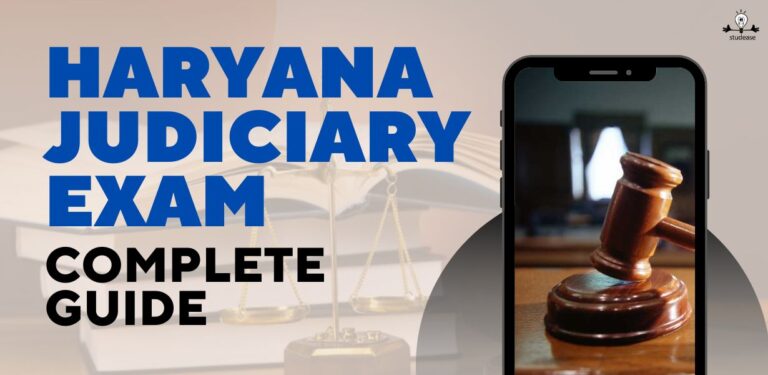
Haryana Judiciary Exam 2024: Your Complete Guide

100 Most Important Essay Topics for Judiciary Exams: A Comprehensive List
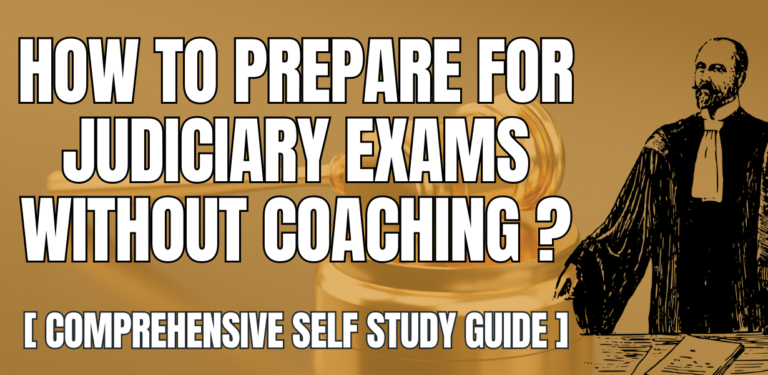
How to Prepare for Judiciary Exams Without Coaching: A Comprehensive Self-Study Guide

Understanding the Law Relating to Injunctions: A Comprehensive Overview
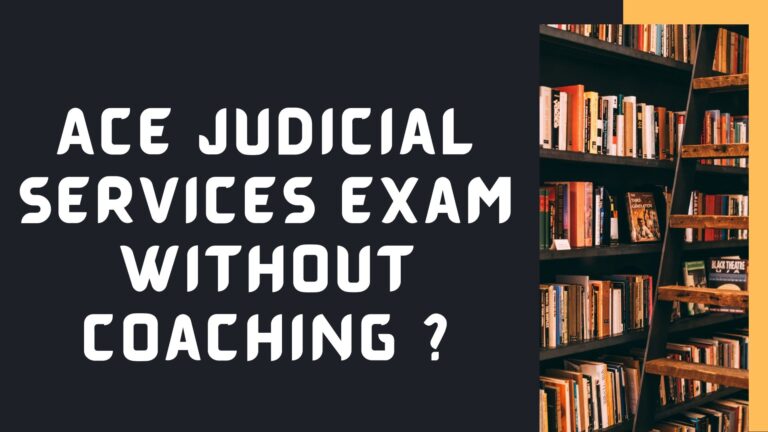
How to Ace Judicial Services Exam Without Coaching?
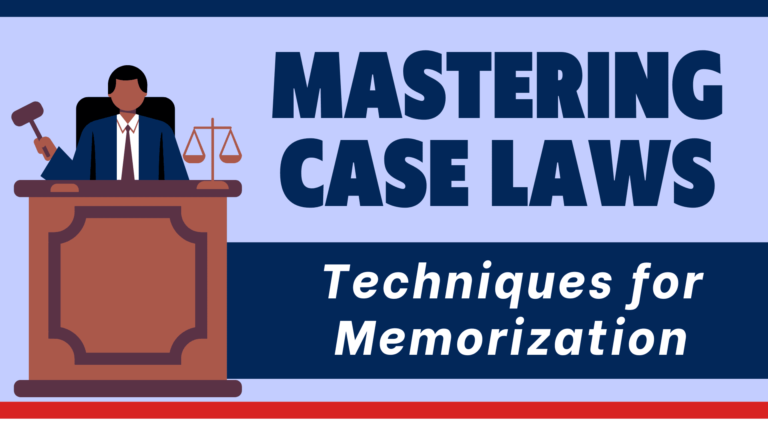
Mastering Case Laws: Techniques for Memorization and Application
Leave a reply cancel reply.
Your email address will not be published. Required fields are marked *
Save my name, email, and website in this browser for the next time I comment.
Insert/edit link
Enter the destination URL
Or link to existing content
9 tips for writing essays in exams

Lauren Condon
Marketing Specialist at Atomi

Essay writing is enough of a struggle when there isn’t any time pressure. Add in a 40 minute limit and that’s pretty much breaking point for a lot of us 🙃 . Well don't stress too much because we're going to help out here with some tricks and tips for writing exam essays* that will actually show the HSC marker all of our killer ideas and skills. This might end up being a pretty hefty post so let’s get cracking straightaway.
* This basically works for things like speeches and long responses as well...
1. Pinpoint the instructions in the question
Before you even start writing, you need to be reading each word of that essay question super carefully. Make sure you’re following instructions and paying attention to the little things that are actually... big things. Do they want you to write a speech or an essay? Do they specify that you need ONE, at least ONE or TWO or more related texts? No excuses for skipping this step because you can just do it during reading time.
2. Draft a quick plan of the structure
Always, always, always plan your essays in an exam. Like… always. The kick of pure fear adrenaline when you start an exam can make it pretty tempting to get writing asap but save yourself a world of pain and take a few minutes to plan. You want to basically write down your thesis (probably one you’ve prepared earlier but tailor it to the specific question) and the structure of your body paragraphs. We go into a bit more detail on planning over here if you’re keen 👍 .
3. Manage your time in writing the essay and the whole exam
Two tips here (lucky you) but basically you need to manage your time in writing the essay and manage your whole exam time. So firstly, you have to leave yourself enough of the exam time to do your essay. If the exam is something like English Paper 1, you know that a third of the (two hour long) exam is an essay so you should be starting that essay with at least 40mins to go.
Hot tip: a lot of top students try to move through the first two sections of that exam fairly quickly so they have more time for a banging essay 💯.
When it comes to writing the essay, the structure you planned out will let you know if you’re on track or not. 40 minutes to write an essay and you have an intro, conclusion and four body paragraphs? Sweet. Well then it’s pretty clear that you should get your intro and the first two paragraphs done in 20 minutes. If you kind of messed up the timing of the whole exam and you don’t have your full 40 minutes then pick up the pace and if you can’t do that, time to make some quick decisions about what to cut.
4. Write out your evidence first so you don’t forget it
This isn’t a must but can be seriously helpful. Every essay needs evidence. It might be quotes, it might be dates, it might be stats. Even though you’ve definitely memorised these perfectly by the HSC (lol), it’s worth having a strategy for making sure you put all your evidence in. My personal tactic was, before starting to write the essay, to scribble that evidence (or just a keyword to jog my memory) down at the top of my planning paper or scribble it under the plan I wrote. That way, if I had a total mind blank when I got to writing a certain paragraph, I didn’t have to leave the evidence out or waste time trying to remember it.
5. Keep it structured
This one is pretty closely related to the point about planning but hey, can’t push it enough. The pressure of writing essays in exams makes it sooooo easy to start rambling and just chucking idea after idea after idea onto the page. Make a structure during your planning and be really strict about sticking to it to keep your essay as clear and strong as possible. Keep your paragraphs to a regular structure like PEEL/PEAL (point, example, explanation/analysis, link) so you have a clear idea of when you’ve written enough in each paragraph and when it’s time to just move on.
6. Have some potential theses and essay structures prepared
Memorising essays gets a little controversial but I think we all agree that you need to, at least, have a few ideas and potential essay structures going into that exam room. Some of us will try to remember whole essays word-for-word which isn’t officially recommended but as long as you are prepared to ( and know how to ) adapt it to the question then it shouldn’t be too bad. It’s really about finding out what approach works best for you but having some possible essays structures and flexible thesis ideas up your sleeve will make sure that you can write an impressive essay in just 40 minutes.
7. If you get stuck, your best bet is to pause for a second
Having a mind blank during an exam is not a good feeling because the clock is literally ticking and there isn’t a way you can magically force yourself to remember a quote or come up with an idea. It will feel pretty stressful but your best bet here is actually to pause and think instead of continuing to waffle on.

Waffling affects the clarity of your essay and the marking criteria about the ‘composing’ of your response. It also might affect how well the marker thinks you understand your argument so it’s always better to pause, give yourself a few seconds to try and reach a solution. If you can’t, either move on and try to come back later or just cut your losses, conclude that point and move on.
8. Don’t forget to anchor your essay with the keyword and source material
Not every essay will give you source material (a picture or quote that you have to refer to) but you will always have a verb or keyword in the question that tells you how to position your argument. When it comes to unexpected source material, here are some tricks and tips and when it comes to the keyword, let’s start by having a look at three questions pulled from the 2016 Advanced English Paper 2 .

- Discuss means you need to pinpoint the issues raised by that statement and provide examples and analysis for and/or against each of those issue.

- How means you need to be providing really solid examples of contrast in Yeats poetry and explaining what that contrast says about personal concerns, political concerns and the relationship between the two.

- To what extent means you need to making a judgement call about how much the themes and ideas in your texts support (or do not support) that statement. This doesn't have to be black and white, you can always say that the texts support that statement in some ways and challenge it in other ways as long as you provide good evidence and analysis to back it up.
All those instructing verbs and keywords came from just one paper so brush on up exactly what they mean and how to use them to anchor your essay . Addressing the keyword and source material really well will show your marker than you are actually answering the exam question, not just chucking out a pre-prepared response.
9. Remind yourself of what the markers are looking for
The overall best tip for writing essays in exams is to remind yourself what your markers are looking for. And no, that doesn't mean you just try to tell your mysterious, probably middle-aged NESA marker what you think they want to hear.
Instead, think about your essay sensibly. Your marker wants to see how well you understand the texts and how the authors communicated those ideas. They want to see how well you understand the concept of Discovery and all its nuances (hint: they’re written out here ). And they want to see how well you can bring all these ideas together and communicate them in a logical, cohesive manner. Don’t get too caught up in fancy language or insanely obscure techniques - you’ve got this.
Writing essays in exams really comes down to being as prepared as possible and having a good strategy for the exam itself. Make sure you’re managing your time and keeping calm enough to write the killer essay you’d be able to come up with outside of the exam room. Happy essay writing… 😬
Published on
October 5, 2017
Recommended reads

How to succeed in Year 12: Recent graduates share their top advice

Tips for short answer and multiple choice questions

10 Tips to get you through an exam
What's atomi.
Engaging, curriculum-specific videos and interactive lessons backed by research, so you can study smarter, not harder.
With tens of thousands of practice questions and custom revision sessions, you won’t just think you’re ready. You’ll know you are!
Study skills strategies and tips, AI-powered revision recommendations and progress insights help you stay on track.
Short, curriculum-specific videos and interactive content that’s easy to understand and backed by the latest research.
Active recall quizzes, topic-based tests and exam practice enable students to build their skills and get immediate feedback.
Our AI understands each student's progress and makes intelligent recommendations based on their strengths and weaknesses.
404 Not found
English Precis Writing for Competitive Exams
Precis-writing is the art of compressing a detailed and lengthy paragraph to one-third while retaining the core ideas and pieces of information expressed in the original paragraph. Writing a precis is akin to writing a summary of an article or a paragraph.
In this write-up, we will learn about the essentials of English precis writing. What exactly are we supposed to do when we are writing a precis?
Essentials of English Precis Writing
While attempting a precis, make sure to follow these guidelines.
1. Length of a Precis
Firstly, you need to know that when a paragraph is given to you, it consists of a certain number of words. When you make a precis of that paragraph, you are supposed to write one-third of the original paragraph. Let’s say, our original paragraph consists of 90 words. We will divide 90 by 3, the answer that is 30 would be the length of our precis.
2. Omit Repeated Ideas in Precis
Often a given paragraph contains repeated ideas. Let’s take an example;
Suppose the original paragraph starts with these lines.
It was raining outside. Cold gusty winds were blowing. People were walking outside wearing coats. Heaters were on inside houses. Ahmed made up his mind to visit the doctor.
As we can see that the first ‘four’ lines are the repetition of the same idea i.e. ‘ it was a cold rainy day’. So, while making precis, we would write; ‘ On a cold rainy day, Ahmed decided to visit the doctor .’ As you can see, we have compressed four lines into one single sentence.
3. Use Simple (Easy to Understand) English in Precis
The purpose of writing an English precis is to reproduce the given information in the simplest possible way so that any ordinary reader would understand the information. For that sake, we must use simple and plain English while writing precis. Using difficult vocabulary and difficult idiomatic expressions isn’t advisable at all.
4. Maintain a Flow in Precis
While writing your precis, make sure the ideas presented are well connected and present an orderly flow of information. Your sentences should be well-connected and coherent. Doing this would make it easier for the reader to grasp the idea or gist of the information provided.
5. Do not add anything in the precis on your own
While writing precis, do not try to explain, analyze, or give examples to clarify something. Your precis must be written objectively on the basis of whatever information is already provided. I repeat; no addition on your own.
6. Omit Examples
Often in the paragraph, examples are provided that you need to omit while writing precis.
For Example, ‘Ahmed was a hardworking student. He studied day and night. He never left his homework unfinished. After securing good marks in intermediate, he got admission to a medical college.’
In the first three sentences, the main point is ‘hardworking student’. The other two sentences are corroborating that main point. So, we would skip/omit those things (examples) in precis moving to the next main/important point.
7. Always write Precis in 3rd Person
Precis is always written in the third person. For example, if the original text is something like; ‘I think education is the major factor behind the success of any country.’ While writing a precis, this particular sentence will be written as ‘the writer opines that education is a key to success for any country’.
8. Change Direct Narration to Indirect Narration
The direct narration used in the original paragraph must be changed into the indirect narration in precis.
Precis Writing: Step-by-Step Guide
Before starting the precis, you should read and reread the paragraph at least three times. Often we read a paragraph, and we feel we have understood it completely in our first read. Give it a second and third read, and you will find other bits of information that went neglected in the first read.
While reading the paragraph, underline the sentences or parts of sentences that are giving you some solid or important information. Do not underline the sentences or parts giving repeated ideas/information.
While reading the paragraph to make precis, you would definitely come across some difficult words that would be hard to understand in isolation. Here, try to understand the meaning of those words in the context in which they are used.
One more thing; count the words of the paragraph and do the calculations for the length of the precis. The ideal length, as already discussed, is one-third of the original.
Once you are done reading it at least three times, go for the first draft of precis. It would be better if you avoid looking at the original text while writing the first draft. Make the draft on the basis of the information you have already gathered through repeated readings.
Re-read your first draft and make sure your sentences are well-connected and the information provided is not repeated anywhere.
A Quick Tip: Make sure that if you are again asked to write a precis of the precis you have just written, you would find no room for the further omission of information.
Keep editing your precis drafts unless you find them perfect and compact.
- Essay Writing Tips Competitive Exams
You may also like

Should We Join Academy For ISSB?

Sociology MCQs from the Past CSS Papers – CSS...

Gender Studies MCQs from the CSS Past Papers –...

Criminology MCQs from CSS Past Papers – CSS...

International Relations (IR) MCQs from CSS Past Papers...

Initial Tests for PMA Long Course & Graduate...
About the author.
A versatile human being with a passion for reading and writing - always striving for growth, living in the moment but trying to keep pace with the evolving world.
[…] Also Read: How to Write a Precis […]
[…] Read: How to Write a Precis Spread the […]
[…] Precis writing is easier and there is nothing to worry about it. Solve the precis paragraphs from the past papers in the proper way. To know the essentials of precis writing, read this article. […]
Paragraph………
Ahmed was a hardworking student.He studied day and night.He never left his homework unfinished.After securing good marks in intermediate he got addmition in a medical college.
Precis …….. Ahmed was a hardworking student he always worked hard to be success .
Ye sahi hai ya nai ?
‘He always worked hard to be successful’ is addition and adding a new idea is against the rules of precis-writing.
Leave a Comment X
Save my name, email, and website in this browser for the next time I comment.

How To Write Essay For Exams in English (PDF)
Tips on how to write essay in english for exams.
Tips on How To Write Essay In English For Competitive Exams (Download PDF) – Essay writing is a special art. For this, it is very important for the person writing on that topic to have complete knowledge, but to write any knowledge in a logical and coherent way, there is a special need for logical skill, practice, and subtle technique. Only then the reader of essay writing can understand. let’s start, How to write an essay in English?
What is an essay?
Any essay needs to be well organized, planned, and well presented so that the reader develops an interest in reading. The essay should be neat and clean, use simple and easy-to-understand language, and have an interesting way of presentation. In particular, it should be based on logical ideas, facts, and figures related to the subject.
Any essay can have multiple purposes, but the basic structure is the sum, regardless of the topic. If you are writing an essay to debate a particular point of view or to explain the steps required for the welfare of society. So, either way, the basic layout of your essay should be the same. If you follow some really simple steps, you will find that the essay is almost written. Which requires you to apply your ideas, facts, and figures, which are essential steps to writing an essay.
The following simple steps should be used when writing an excellent essay.
- Select the topic.
- Outline your thoughts.
- Write the introduction.
- Next, the subject body.
- Write the main points.
- Write the sub-points.
- Elaborate on the points.
- Write the conclusion.
Select a topic for your essay
Selecting a topic is an important task before writing an essay. Evaluate from the list of each topic on which you want to write. You should consider each one individually. You should choose the subject about which you have a detailed knowledge of facts and figures, and should be sure that it is the subject about which you are particularly aware.
Make sure it’s a topic you’re at least moderately passionate about. Specifically, the most important factor in writing on a topic is the number of facts and ideas you have about that topic. No matter what topic you find particularly appealing.
You choose a subject that is less likely to be chosen by other candidates or may be chosen by some candidates. This will make the essay less likely to compare with what you have written, so as you proceed to write an essay, revisit the topic you have chosen. Once you are sure that your topic is suitable. Start writing.
The purpose of any topic outline is to put your ideas and paper in a generally organized format. A well-thought-out layout is the heart of a very good essay.
Be sure to write the title of your topic at the top of the essay page. If you are trying to write your best argument, or you are trying to explain the purpose of writing the steps to follow. So start with Roman numerals for the main points you have about the topic, like the first second, and third. You have to group those points into categories.
If you have a problem grouping each of the steps into categories, use writing at the beginning, middle, and end. If you want to make a note, write down the major categories into which your information can be divided.
Below all Roman numerals, write a b and c down the left side of the essay, followed by facts or information that supports the main points. Now, you will have the basic structure of your essay so that you can continue writing the essay.
Introduction
The essay should present a complete idea about the topic to the reader.
Start with a catchy title such as:
(a) preliminary knowledge of the subject
It must contain all true information that can only be relevant facts. It clearly shows the point you want to explain. If you want to use a startling piece of information, follow it with a few sentences.
(b) anecdote of the subject
An anecdote is a story that explains your point. Make sure your anecdote is short, precise, to the point and relevant to the topic. This can prove to be a very effective point for the essay.
(c) dialogue or quotation of the subject
For a quotation to be a suitable dialogue, it is not necessary to identify the reader, but the reader should understand the point of view you are trying to convey.
Body paragraph
The topic you have chosen now needs to be fully explained and described, or further argued. All the points set forth for this must be proved. Each key point written should be detailed in the main paragraphs. If you have three or four main points, you need to elaborate in three or four main paragraphs.
All body paragraphs should have the same basic structure:
1. Begin by writing your main point in the form of a sentence.
2. Then, write down each of your supporting points.
3. Explain each point in detail, in the blank space, and below each point. Further details or clarifications in detail or the points already noted in the previous layout can be discussed.
The essay needs to end with a powerful and logical conclusion that everything you discussed earlier has a consequence. The conclusion brings the reader closure to the topic, and the final conclusion of the topic summarizes the points written to provide three or four strong, effective and logical sentences. Now simply review the main point or briefly describe your feelings about the topic. Explanations and anecdotes can end your essay in a useful and effective way. Conclusion It provides a final and effective form to your essay.
Worth Remembering:
If your essay is poorly written and not understandable by the reader, you will lose points. And, in the outside world, you get failure. It is very important to write in a clear style, with good clear composition and proper punctuation. Needless to say that even spelling mistakes can affect your thoughts.
Download PDF – Click Here
FAQs. How To Write Essay For Exams
What is important in essay writing.
Answer- The process of essay writing is an important part of study for the main reasons as it enhances understanding. Writing aids in the learning process, in addition to collecting and clarifying, organizing ideas and information, analyzing the source material, and making critical decisions.
How do I write an essay?
Answer – To write an essay, there is a need to focus on some important topics such as:
- Brainstorm your topic.
- Decide what kind of essay to write.
- Research the topic.
- Develop a thesis.
- Choose a writing style.
- Outline your essay.
- Edit your writing to check spelling and grammar.
- Write your essay.
How many paragraphs to write the essay?
Answer – The basic format of a good essay is known as a five-paragraph essay, but it is not necessary. An essay can have as many paragraphs as necessary. An essay consists of five paragraphs. If you can’t write much, an essay should have three sections: an introduction, a body, and a conclusion.
Read also –
- How to promote tourism in India Essay
- Emerging trends in management Essay
- Essay on water boon or curse
Related Articles
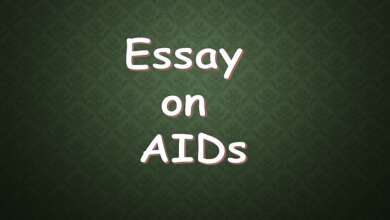
Short & Long Essay on AIDs in 100, 250, and 500 Words

Essay on Water a Boon or Curse 1000 Words | PDF
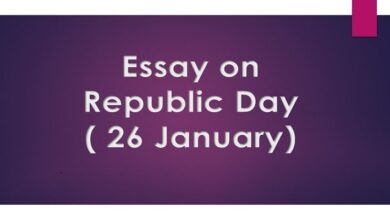
Essay on Republic Day in 500 Words | PDF

Essay on National Integration | Download PDF

Self Study Mantra
- Essay for IBPS PO Mains
- Essay for State PSC
- Essay for Banking Exam
- Important Essays
- Letter Writing
- हिन्दी निबंध
- One Word Substitution
- Computer Knowledge
- Important Days
- जीवन परिचय
- Government Schemes List
Trending Essay Topics | Important Essay Topics for Competitive Exams
Essay writing is a part of various competitive exams. In most of the essay wring exams, trending topics are selected as subjects for essay writing. Here we have prepared a list of trending essay topics which are the most important essay topics for all upcoming competitive as well as academic exams.

- Trending Essay Topics
- Essay on PM Surya Ghar Muft Bijli Yojana: Read Here
- Ram Mandir Pran Pratishtha: A Resolution to Ramrajya: Read Here
- Essay on ICC World Cup 2023: Read Here
- Essay on One Nation One Election: Read Here
- Download PDF of these Essays: Click Here
- Essay on Mission Chandrayaan-3: Read Here
- Essay on Beat Plastic Pollution: Read Here
- Essay on Solutions to Plastic Pollution: Read Here
- Essay on Green Growth: Read Here
- Essay on Vasudhaiva Kutumbakam: Read Here
- Essay on e-₹UPI: Read Here
- Essay on G20 Summit: Read Here
- Essay on UPI Advantages and Disadvantages: Read Here
- Essay on Cashless Economy: Read Here
- Essay on NPA Crisis in India: Read Here
- Essay on 5G Technology: Read Here
- Essay on Non-performing Assets (NPA): Read Here
- Essay on Astro Tourism: Read Here
- Essay on PM SHRI School Scheme: Read Here
- Meri Mati Mera Desh: Read Here
- Essay on Artificial Intelligence (AI): Read Here
- Essay on Commonwealth Games 2022: Read Here
- Essay on Har Ghar Tiranga : Read Here
- Essay on My Vision for India @ 2047: Read Here
- Essay on Circular Economy: Read Here
- Essay on Menace of Fake News: Read Here
- Essay on Power Crisis in India: Read Here
- Essay on Freebie Politics: Read Here
- Essay on Cryptocurrency: Read Here
- Essay on Natural Farming: Read Here
- Free and Fair Election: Read Here
- Governance 4.0 : Read Here
- Raising Legal Age of Marriage for Women : Read Here
- PM Ayushman Bharat Health Infrastructure Mission : Read Here
- Electric Vehicle -The Future of Transport : Read Here
- Azadi Ka Amrit Mahotsav : Read Here
- Essay on Climate Change : Read Here
- Download PDF of these Essays: Click Here
- Corona and its impact on human life : Read Here
- E-lerning: The Future of Education System : Read Here
- AatmaNirbhar Bharat : Read Here
- Vocal for Local : Read Here
- Advantage and Disadvantage of Online Classes : Read Here
- Single Use Plastic ban : Read Here
- Addiction of Social Media : Read Here
- Causes of Environmental Pollution : Read Here
- Uniform Civil Code : Read Here
- Essay on Hate Speech: Read Here
- Role of Students in Eradication of Drugs : Read Here
- Why Population Control is necessary : Read Here
- International Trade: The bedrock of economic development: Read Here
- Impact of Poverty on Education : Read Here
- Importance of Education : Read Here
The above essay topics are the most important essay topics for all competitive exams as well as academic exams. These essay topics are currently in focus and discussed by everyone due to its current relevance. Therefore, these essays are trending essay topics for all competitive exams.

In addition to these trending essay topics , here is a list of evergreen best essay topics that are very important.

Evergreen best essay topics
- Beat Plastic Pollution (Click on the Topic to Read Essays)
- Meri Mati Mera Desh
- Hate Speech
- PM SHRI School Scheme
- Plastic Waste Management
- Envisioning India @2047
- Commonwealth Games 2022
- Women Empowerment
- Advantages and Disadvantages of Internet
- Essay on Menace of Fake News
- Essay on Power Crisis in India
- Essay on Freebie Politics
- Unsung Heroes of Freedom Struggle
- Cryptocurrency

- Azadi Ka Amrit Mahotsav
- Natural Farming
- Download 50 PDF Essays for all Exams
- Free and Fair Election
- Advantages and Disadvantages of Online Classes
- Corona and Its impact on human life
- Single-use plastic ban
- Impact of Poverty on Education
- Water Pollution: Causes and Prevention
- Environmental Pollution
- Addiction of Social Media
- Importance of Trees
- Importance of Education
- Natural Disaster
- Role of Students in eradication of drugs
- Human Trafficking
- Benefits of Yoga
- Online Shopping
- How to control pollution
These are the best essay topics for all competitive exams which contains all the current topics also. Above trending essay topics are most expected essay topics for competitive exams.

Due to its current relevance these trending essay topics are most important for all exams. Hope these trending essay topics helped you in your exam preparation.
You may like these posts
Post a comment.

- Download PDF Essay for All Exams
Download PDF Essay for All Exams Most important essays ranging from 250 words to 1000 …

Popular this Month

20 Most Important Formal Letter Topics for Class 10 | Formal Letter Topics for Class 10

My School Essay in English 10 Lines, Essay on My School

Essay on Electric Vehicles: The Future of Transport, Benefits of Electric Vehicles uses, Electric Vehicles

Essay on One Nation One Election for Competitive Exams

My Family Essay in English 10 Lines, Essay on My Family

Essay Topics for Class 6 Students | Essay Topics for Grade 6

Essay Topics for Class 12 | Essay Topics for Grade 12 Intermediate

20 Most Important Essay Topics for GIC Scale 1 Exam 2024 | General Insurance Corporation of India GIC Essay Topics
One word substitution (download here👇👇).
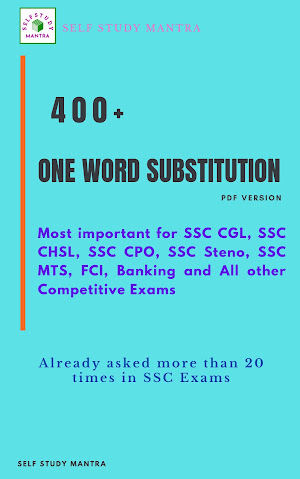
Essay Writing in English
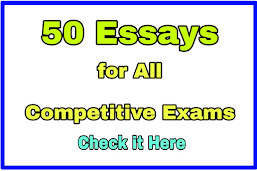
Important Topics
- Essay in English
- Essay in Hindi
- 20 Essays for IBPS PO Descriptive Paper
- IBPS PO Previous Year Descriptive Paper
- Important Essays for UPSC
- Essay Topics for UPSC CAPF AC Exam
- How To Crack SSC CGL In First Attempt?
- 100 Most Important One Word Substitution
- Essay on Artificial Intelligence
- Latest Jobs | Admit Card | Result
- Essay on Global Warming
- पर्यावरण प्रदूषण: नियंत्रण के उपाय
- Essay on Women Empowerment
- Daily Homework for Class 1 to 5
Blog Archive
Quick links.
- Paragraph in English
- Join Self Study Mantra through WhatsApp, Facebook, Telegram
- Advertise With Us
- Career with Us
- Privacy Policy
- Disclaimer, Terms and Condition
- 10 Lines 13
- Best Books for SSC CGL 2
- Biography 6
- Education System 6
- English Grammar 1
- Essay in Hindi 18
- Essay Topics 32
- essay writing 150
- Farmer Welfare Schemes 1
- Important National and International Days 31
- Mathematics 5
- One Word Substitution 2
- Online Classes 3
- Paragraph Writing 19
- Political Science 1
- Pollution 7
- Republic Day 1
- Speech in Hindi 1
- SSC Exams 5
- Study Tips 7
- जीवन परिचय 6

Azadi Ka Amrit Mahotsav Essay in English

Essay on Advantages and Disadvantages of Online Classes

Important Days in 2024 | Important National and International Days | Important Days and Dates
Copyright (c) 2019-24 Self Study Mantra All Rights Reseved
1645778413.png)
- Udaan Programs
- Udaan Webinar
- IBPS SO LAW
- Civil Judge (Pre+Mains)
- Hotel Management
- CAT & OMETs
- Jaipur [Bapu Nagar]
- Jaipur [Vaishali Nagar]
- Jaipur [JLN Marg]
- Delhi (South Extension)
- Delhi (Pitampura)
- Delhi (CP Center)
- Delhi (Dwarka)
- Gurugram (Sector 27)
- Gurugram (Sector 50)
- Mumbai (Andheri)
- Mumbai (Navi Mumbai)
- Mumbai (Thane)
- Chandigarh Sector 36D
- Chandigarh Sector 8C
- Lucknow Hazratganj
- Lucknow Aliganj
- Jaipur (Bapu Nagar)
- Jaipur (Vaishali Nagar)
- Gurugram (Sector 14)
- Chandigarh 36D Sector
- Chandigarh 8C Sector
- Jaipur[Vaishali Nagar]
- Navi Mumbai
- Lucknow [Aliganj]
- Lucknow [Hazratganj]
- CUET Law 2024
- IPMAT Indore
- IPMAT Rohtak
- Christ University
- St. Xaviers
- Advance Test Series
- Madhya Pradesh (MPCJ)
- Chhattisgarh (CGPSC)
- Jharkhand (JPSC)
- Delhi (DJS)
- LegalEdge AISAT
- LegalEdge IST
- Scholarship Test (English)
- Scholarship Test (Hindi)
- SuperGrads IPM AISAT
- SuperGrads IPM IST
- Supergrads CUET
- SuperGrads CAT
- Creative Edge
- LegalEdge After College
- LegalEdge AIOM
- SuperGrads AICUET
- Judiciary AIOMC
- Supergrads IPM AIOM
- CreativEdge AIOM
- Next Gen Internship
- Masterclass
Free Videos
- CLAT Free Videos
- Uttarakhand
- Judiciary Notes
- Judiciary Videos
- KAUN BANEGA JUDGE
- Daily Current Affairs
- Weekly Current Affairs
- Monthly Current Affairs
- LegalEdge UG
- SuperGrads Webinar
- SuperGrads CUET Webinar
- Creative Edge Webinar
- Judiciary (Beginners)
- UDAAN Webinar
- Law School Blogs
- LAW Entrances
- Management Entrances
- CUET Exam [UG & PG]
- Architecture Entrances
- LAW & Judiciary
- Design & Architecture
How to write Essay in Judiciary Exams [Expert Tips and Techniques]
Author : Yogricha
Updated On : January 12, 2024
Overview: Essay writing forms an important part in most state judiciary examinations for Mains and if you want to crack any of these exams you must know how to write Essay in Judiciary Exams. 80% State Judiciary exams have a different paper of essay to test your social and legal knowledge and your writing skills.
Judicial Services exams are highly competitive, and essays play a pivotal role in the evaluation process. For writing a compelling essay you must understand the question and then plan the structure of your answer in advance. Although there isn't a universal formula for essay writing, some fundamental principles can serve as valuable guidance. Primarily, your essay should exhibit strong social and legal arguments. Clarity, conciseness, and error-free writing is equally vital. Following these tips increases your prospects of excelling in your Judicial Services exam.
In this article we will cover:
Overview of How to write Essay in Judiciary Exams?
How to write essay in judiciary exams: a step-by-step guide.
- Important Topics for Judiciary Exams
- Download Sample Essay for Judiciary
Download FREE Study Material for Judiciary Exam by Judiciary Gold
Essay writing is a skill that we all cultivate during our school years. However, the level of essay writing expected in competitive exams far exceeds what we encountered in middle school. Failing to compose a well-structured and well-informed essay can result in a deduction of marks, making it crucial for aspirants to master this art.
Read More : Short Tricks to Memorize Bare Acts for Judiciary exams
In judicial exams language paper, essay writing typically falls into three categories:
- Essays on Social Themes : These essays revolve around topics like women's empowerment and corruption, often addressing contemporary socio-legal issues.
- Essays on Current Affairs: In this category, candidates are assessed on their capacity to analyze and express informed opinions regarding significant global developments.
- Essays on Cultural Heritag e: These essays serve to evaluate a candidate's knowledge of cultural heritage of the respective state, providing insight into their understanding of this aspect.
Read more: Upcoming Judiciary Exams
While the specific essay requirements may vary from state to state, the general pattern remains consistent. Writing a successful essay demands a holistic approach, encompassing various crucial elements. Effective essay composition necessitates logical content construction, a key trait exhibited by high-scoring candidates.
Every essay should consist of the following four components:
- Introduction
- A body that incorporates the exploration of causes and consequences
- Relevance of legal provisions (if applicable)
Mastering the art of essay writing is a valuable skill that can significantly enhance your performance in competitive exams, ensuring their ability to articulate ideas and arguments effectively.
Check now: List of all Important topics of Essays in Judiciary Exams
Crafting an excellent essay hinges on two key factors:
- language proficiency
- content quality.
Achieving mastery in essay writing requires dedication and practice. You can't become a proficient writer overnight, so it's essential to initiate the preparation process correctly. Solving previous year's Questions Papers for Judiciary Exams will help you know the difficulty level and the type of questions asked in the essay paper.
The following are some of the best essay writing preparation tips for the Judiciary exam :
Daily Reading and Essay Writing : To master the art of writing an Essay in Judiciary Exams, begin your journey by immersing yourself in editorials and engaging in essay writing. Consistency is key, so aim to write essays daily or every alternate day. Through this continuous practice, you will gradually refine your writing skills. Reading newspapers, particularly editorials, offers a unique advantage. It allows you to observe how well-structured pieces are created, an aspect often overlooked by many.
Effective Introduction and Conclusion : An essential aspect of essay preparation is crafting compelling introductions and conclusions. It's crucial to understand that these two components are distinct. Avoid the pitfall of duplicating content between them. A well-rounded essay should conclude by summarizing the entire discussion while incorporating your personal perspective and opinions.
Practice with Past Topics : To build a strong foundation, begin by working on ten common essay topics sourced from previous years' question papers and online resources. Once you've honed your skills on these subjects, shift your focus to contemporary topics related to current affairs. Whenever possible, enrich your essays with relevant quotations that align with your chosen topic.
You must also read English preparation tips for Judiciary Exams that will help enhance your grammar and vocabulary, which are essential for writing a good essay.
Essay writing is an art that evolves with time and consistent practice. Following these guidelines and dedicating yourself to regular writing, you can significantly enhance your essay crafting skills, ultimately improving your performance in competitive exams.
Read More: Judiciary Exam Eligibility 2023
Enhance Your Essay Writing Score with These Tips:
Start with a compelling introduction: Initiate your essay with a powerful introduction that captivates the examiner's interest while providing a glimpse of your essay's theme. Begin by introducing the primary subject of your essay and subsequently narrow it down to the specific points you intend to address. Ensure that your introduction is not only well-written but also engaging.
Ensure structured organization : Your essay's structure is important, you must make it easy for examiners to follow your narrative. A clear structure encompassing an introduction, body paragraphs, and a conclusion is essential. Each body paragraph should concentrate on a argument, and a seamless transition between them should be maintained. Deploy transition phrases to facilitate the examiners seamless progression through your essay.
Read more : Judiciary Exam Syllabus
Support your statements with cases and examples: Whenever you present arguments in your essay, substantiate them with concrete evidence and illustrative examples. This approach develops credibility of your arguments.
Use proper Grammar : Grammar and style wield immense influence over the quality of your writing, particularly in academic essays. Carefully proofread your eassy on the exam before submission. Additionally, make sure that you use legal language while writing your essay. Make your essy readable and avoid jargon or excessively intricate sentence structures that might disorient or disengage the examiner.
Edit and proofread rigorously: Upon completing your essay, allocate time for comprehensive editing and proofreading prior to submission. This review serves to eliminate mistakes in your essay. Scrutinize both the essay's content and legal and social knoweldge, including grammar and spelling.
Read About: Judiciary Exam Preparation Tips
Important Topics for Judiciary Exams:
For a judiciary aspirant it is important to know to the topics that have been previously asked in the judiciary examination, here are some topics you can focus on:
- RBI Regulation of crypto currency
- Independence of Judiciary
- Regulation on import of Drones in India
- Child Labor in India
- Uniform Civil Code
- Women Reservation
- Reservation on the basis of caste
- Courts power to decide religious issues
- Human Rights in India
- Data Privacy and protection
- Right to speeh and expression
- Hate speech / Free speech limits
- Right to Information
- Mob lynching
- Global Warming
- Living wills / Euthanasia
- Media responsibility in reporting
- Future pf democracy in India
- Judicial activism and overreach
- Honor Killing
- Right to privacy
- National Education Policy
- Role of women in nation building
- Marital Rape
- Death sentence
Sample Essay for Judiciary:
In this article we have covered all the important details needed for you for your preparation. Download the sample essay from the button given below to get the correct idea of how to write an essay for judiciary.
Download FREE Sample Essay by Judiciary Gold
Read about: How to Prepare for Judiciary Exams from Scratch
Conclusion:
Essay writing is an esay yet and important skill set that you must achieven in order to score better in Judiciary Exams. Follow the tips given above on How to write Essay in Judiciary Exams, practice as much as possible, and get you essasys checked by your Mentors or faculty to know your mistakes and weak areas. Key points to note while writing an essay for judiciary are as follows:
- Read well written essays and articles to gain an understanding of the essence of effective essay writing.
- Cultivate a daily practice of reading newspaper editorials, as essay prompts often draw from current events.
- Jot down quotes from books and newspapers that can be used in your essays.
- Curate compelling opening and closing lines to enhance your essay-writing skills.
All the best Judiciary Aspirants!
Download Judiciary Study Material
Fill your details
Recently Published
Bihar Judiciary Vacancy 2024 | Latest Vacancy Released
Updated On : March 31, 2024
How to Start Judiciary Exam Preparation at Beginner Level?
Life of a Civil Judge in India in 2024
How to Read Bare Act for Judiciary Exams 2024 in 5 Simple Steps?
Gujarat Judiciary Exam 2024 - Exam Pattern, Selection Process, Eligibility, & More
Frequently Asked Questions
What are the stages in the Delhi Judiciary Exam Selection Process?

What is the marking scheme of Judiciary Prelims and Mains Exam?
What are the newspapers that you can follow to clear the Rajasthan Judiciary Service Examination?
When is the last date to submit the Haryana Judiciary Application Form?
Is it necessary to opt for the coaching classes to clear the MP Judiciary Service Examination?
What is the minimum percentage which is needed to appear for the Delhi Judiciary Service Examination?
What is the required eligibility criteria for the Bihar Judiciary Exam 2023?
The Study Material shall be provided in which format?
After I purchase my package/plan, how soon will it be activated?
How many marks are required to clear the Prelims exam for Uttarakhand Judiciary Exam?
How many attempts can one make to clear the Punjab Judiciary Service Examination?
How many attempts can be made to pass the Odisha Judiciary Service Examination?
What is the best way to prepare for Chhattisgarh judiciary 2023?
What is the best method to prepare for judicial exams?
How to read bare acts for judiciary exams?
January 12, 2024
Online Coaching
Test Series
Trending Exams
- Architecture
- Career Counselling
Scholarship Tests
- Judiciary Gold
- Supergrads IPM
- SuperGrads CUET
Mentor Tips
- CLAT Prep Tips
- AILET Prep Tips
- IPMAT Prep Tips
- NATA Prep Tips
- NID Prep Tips
- Judiciary Prep Tips
- CAT Prep Tips
ABOUT TOP RANKERS
Toprankers, launched in 2016, is India’s most preferred digital counselling & preparation platform for careers beyond engineering & medicine. We envision to build awareness and increase the success rate for lucrative career options after 12th. We offer best learning practices and end-to-end support to every student preparing for management, humanities, law, judiciary & design entrances.
: +91-7676564400
Social Channels


IMAGES
VIDEO
COMMENTS
This would make the essay strong and convincing. The candidate should try to make a persuasive argument (mostly the question of the essay does not have close ended answers of right or wrong) in order to sound convincing to the evaluator. In case the candidate gets a topic which he/she has not practiced, it is best not to panic.
General English for Competitive Exams. Most competitive exams test the verbal skills of candidates with questions based on topics like Nouns, Pronouns, Adjectives, Adverbs, Tenses, Prepositions, Conjunctions, Active and Passive Voice, Reporting Speech, Diction, etc. Knowledge of these topics will help you answer the questions on the verbal ...
Candidates will get competitive exams PDFs on English pertaining to various topics containing lists, rules and general English questions and answers. Aspirants who are willing to apply for the various Government exams 2023 must go through the topics of general English for competitive exams, as the English language is a key part of the syllabus ...
Constant written practice is required for honing essay writing skills. Writing alone tests the competency of the students to ideate and execute a proper essay within a specified time. 2. In-depth knowledge on various topics is a prerequisite for students preparing to write essays in school exams and competitive examinations.
How to write well for essay type questions in competitive exams. Mittal gives details on each of the five elements. 1. Hook. To engage a reader and make them want to read your entire content is key to being a successful writer. A number of aspects are critical in capturing the attention of the reader.
Enrol to StudyIQ's Flagship UPSC IAS (Pre + Mains) LIVE Foundation Batch 9. Admissions closing on 10 DEC'22 | Enrol now - https://bit.ly/upscbatch9A time-te...
Most essay questions will have one or more "key words" that indicate which organizational pattern you should use in your answer. The six most common organizational patterns for essay exams are definition, analysis, cause and effect, comparison/contrast, process analysis, and thesis-support. Definition. Typical questions.
Do your research and gather sources. Come up with a thesis. Create an essay outline. Write the introduction. Write the main body, organized into paragraphs. Write the conclusion. Evaluate the overall organization. Revise the content of each paragraph. Proofread your essay or use a Grammar Checker for language errors.
You must be realistic about the time constraints of an essay exam. If you write one dazzling answer on an exam with three equally-weighted required questions, you earn only 33 points—not enough to pass at most colleges. This may seem unfair, but keep in mind that instructors plan exams to be reasonably comprehensive.
Exam Prep: Writing Essays. English language exams typically have a writing section, and many of those require test-takers to write an essay in a timed environment. If your students are preparing for such an exam, here are some practices they can employ to better prepare themselves for the writing section.
Essay: Format, Key Points, and Types. Essay writing is a creative skill that needs a creative bone. If you are a student, you must be aware of how critical it is to know the art of essay writing. Essay writing is important because it makes our reading and writing better. An essay is a piece of writing which is created from the creativity of the ...
Essay writing is an important component of various competitive examinations. However, we will focus our strategy on the kind of essay which is to be written in the Essay paper of the Civil Services Main Examination conducted by the UPSC. It will also be of help for aspirants who are appearing for other competitive exams like State PCS, CAPF, etc.
List of General English Grammar for Competitive Exams. General English and Grammar questions are an easy way to score in the government exams. The questions on the English Language can only be answered with a fair knowledge of the subject. ... Essay Writing: Letter Writing: Comprehension: Reading Comprehension on any random topic: Grammar ...
Essay Writing Expectations. When you're preparing for competitive exams, your writing should reflect a strong grasp of the English language. Your essays are a vital tool to communicate your understanding of various topics and showcase your writing skills. Here's what is expected: Substance: Engage with a wide array of essay topics.
2. Draft a quick plan of the structure. Always, always, always plan your essays in an exam. Like… always. The kick of pure fear adrenaline when you start an exam can make it pretty tempting to get writing asap but save yourself a world of pain and take a few minutes to plan. You want to basically write down your thesis (probably one you've ...
Supercharge your competitive exam preparation with our comprehensive General English course! Master the essential language skills required to ace any competitive exam. From grammar rules and vocabulary building to comprehension and sentence structuring, our expertly designed content covers it all. Enhance your fluency, accuracy, and overall ...
Competitive exams required extra personalities with smooth analytical skills. Text an excellent essays requires a lot of facts and figures and different knowledge. According to one Federal Public Service Authorize (FPSC) report, 90 to 95 for cent of candidates fail in the English Dissertation paper.
1. Length of a Precis. Firstly, you need to know that when a paragraph is given to you, it consists of a certain number of words. When you make a precis of that paragraph, you are supposed to write one-third of the original paragraph. Let's say, our original paragraph consists of 90 words. We will divide 90 by 3, the answer that is 30 would ...
Tips on How To Write Essay In English For Exams. Tips on How To Write Essay In English For Competitive Exams (Download PDF) - Essay writing is a special art. For this, it is very important for the person writing on that topic to have complete knowledge, but to write any knowledge in a logical and coherent way, there is a special need for logical skill, practice, and subtle technique.
Competitive English Practice Set Questions and Answer: Major competitive and government exams include English as a requirement. Even though the general English part is difficult, candidates with solid English fundamentals can achieve good results. As a result, this post will cover crucial general English themes for competitive tests.
Role of Students in eradication of drugs. Human Trafficking. Benefits of Yoga. Online Shopping. Download 50 PDF Essays for all Exams. How to control pollution. These are the best essay topics for all competitive exams which contains all the current topics also. Above trending essay topics are most expected essay topics for competitive exams.
The following list entails the fifty most important essay topics for PCS J exams. Prepare these topics well in advance to excel in the Essay section of the Judicial Services Exam: Role of courts/courts during a pandemic. Violence against women. Child rights during lockdown.
The following are some of the best essay writing preparation tips for the Judiciary exam: Daily Reading and Essay Writing: To master the art of writing an Essay in Judiciary Exams, begin your journey by immersing yourself in editorials and engaging in essay writing. Consistency is key, so aim to write essays daily or every alternate day.